|
restoring our biblical and constitutional foundations
|
| welcome |
August 2013 Blog Archives
Saturday, August 31
7:22 PM Seen this? Sloppy Agape.
7:15 PM Bonnie's visit has drawn to a close and she is now safely back with her family in upstate Michigan.
Once again I'm aware of how blessed I am to see Becky enjoying such friendship with a sister in Christ. It's good to see my wife so surrounded by love. Really good.
Hope your weekend is going as well as mine is.
7:48 AM As you folks know, I've published a book called Using New Testament Greek in Ministry. This book has been in general use for 20 years. Because it was meant from the outset to train or assist elders and other Christian leaders in the technique of exegesis, it has served many thousands of students. To keep abreast of changes in technology, I asked Baker if they would be interested in a revised edition in which especially chapter 2 (on Greek tools) would be significantly updated. The publishers felt that the present edition (which is still selling exceptionally well) was adequate. My experience as a teacher and author has shown the wisdom of keeping successfully selling books from being revised. On the other hand, the vast increase in computer technology requires a response of some kind.
For this reason, my assistant Jacob Cerone and I have begun writing a book that will include a description of the most beneficial resources available today for the study and praxis of New Testament Greek, along with annotations. The working title is The 100 Most Essential Tools for Using Greek in Ministry. It tries, as before, to describe the merits and limitations, the convenience and snares of the leading research instruments in use today. Bibliographic recommendations would be warmly accepted. Simply write me at dblack@sebts.edu.
7:37 AM Drewe from Down Under sent this picture.
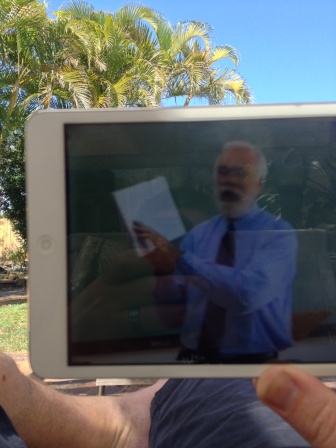
Always wanted to teach Greek in Australia to a class of barefooted students.
Friday, August 30
6:25 PM Today I was delighted to take a former colleague out to lunch at the Olive Garden in Wake Forest. Logan Carson taught Bible at our college for 15 years before his retirement. It was ten years ago next month that he lost his dear wife Miss Pep to cancer. As you can imagine, we had lots to talk about.
In other news, tomorrow we have to say goodbye to Miss Bonnie from Michigan, and it's not going to be easy. Becky and Bonnie met through our blog many years ago, and Bec has never had a more loyal friend. This week they were able to put faces with names. I guess I'm just feeling really excited to know that were able to talk and pray together in person.
As I said, I was in Wake Forest today for a couple of important meetings. While there, my erstwhile Greek student Nathan Brown stopped to pick up his award for reading two verses daily from his Greek New Testament throughout the summer.
I call this the "Five Minute Greek Club." There are no dues and we never meet, but if you fulfill the requirement you get one of my books for free. He selected Rethinking New Testament Textual Criticism. Good choice, Nate. I'm insanely grateful for students who put their knowledge into practice. Makes life sweet.
I dare you to guess what this picture is highlighting.
It's the new John Sailhamer room at our library. Our librarian-in-chief Conan the Madden and his sidekick Steve Frary were kind enough to show me around.
We're blessed to have John's books here, and if you're at all interested in Old Testament studies it's a must see.
Oh, this was waiting for me in my office today.
What a nice serendipity. I actually needed a new mouse pad.
So there you have it -- a day in the life of your favorite obscurantist and infracaninophile.
P.S. I just got an update from Nigusse that we now have three German students studying with us at SEBTS. Can't wait to meet them.
Tschüß!
Thursday, August 29
5:38 PM Roses for my Rose.
4:42 PM As an educator, I am deeply concerned with what people think. But I am equally concerned with how people think. Unfortunately, due to the tragic condition of the American school system, most students are simply told what to think rather than being equipped with tools to think for themselves. This is not a time for evangelicals to ignore biblical truth. Still less is this a time for mindless conformity.
It is no longer possible to ignore the academic vacuum that exists at all levels in our churches. Even pastor-teachers fall prey to what I call educationism – the belief that one can't know anything unless one learns it from this or that "expert." Such an attitude actually produces a shallow conformism since it leads us to believe that we need others to tell us what to think. Many well-meaning friends once warned me about going to the University of Basel for my doctorate. "You'll lose your faith!" they exclaimed. Actually, one of the many reasons I ended up in Switzerland was to have my faith challenged. Thank God I came though still believing in unchanging standards of truth and goodness, but my point here is that students today seldom look for ways to have their beliefs challenged. When I was in college and seminary, I allowed my professors to dictate what the questions were and the method of approaching them. I was told that Mark was our earliest Gospel, that Paul could not have written Hebrews, that the Byzantine Text was secondary. I was rarely asked to look at the evidence for myself and make hard choices. What I sought and desired in school, but rarely found, was a map or a guide by which I could know what questions to ask.
Modern education in the U.S. has largely forsaken the scientific method of inquiry. The result has been unreflective rigidity. This inattention to discovery and heuristics is often a product of an anti-intellectual stream in our past. This is very unfortunate. I want my students to leave seminary with solid biblical convictions, of course, but I also want them to understand how one comes to know (epistemology) and to think (logic). Pedagogy matters. It matters because the systems that are opposed to biblical Christianity use logical arguments and philosophical methods. Michael Peterson, in his magisterial work Philosophy of Education (p. 83), writes:
A complete Christian view of knowledge recognizes that reality is complex and that each of its domains must be known on its own terms. There is no single way to discover all the different truths there are. We must discover empirical truths through observation and experiment, historical truths through records and artifacts, logical and mathematical truths by abstract reasoning, and so forth. Christians have no shortcuts in these areas, but share basic noetic capabilities as other humans.
In other words, if our business as Christians is to glorify God, then that includes glorifying Him with our minds. Whatever it takes, whatever it means, whatever happens to me, am I willing to obey His lordship over my thinking? Students, beware of the pedagogy that says, "You sit still while I instill." And to my fellow educators I say: let us teach our students how to think and not only what to think.
3:02 PM Great news! Becky's energy level is definitely UP, so she is getting lots of work done on her book. She's been dictating to Karen while Bonnie is serving as head cheerleader. Thanks for praying, and please don't stop now.
11:40 AM I do declare, the weather here in Virginia is bi-polar. One day it's raining, the next day the sun is shining. One day it's cold, the next day it's hot. Of course, I'm never that way. I'm always even-keeled. Never up and down. Never hot then cold.
I wish it were true. Caught up in the crossfire of circumstances, I sometimes become as unpredictable as the weather in southern Virginia. I suffer from a crippling disease: being a human. I have known discouragement – a life that Thomas Hobbes once referred to as "solitary, poor, nasty, brutish, and short." I have also known elation. Most days I'm striving to find a balance between the two extremes. Life is a psychic infirmity brought on by the reality of the struggle between darkness and light, flesh and Spirit. So I'm always grateful when I read how Jesus had compassion on people experiencing this kind of distress. I imagine that I struggle where many of you struggle – being preoccupied with the things I've done (or failed to do) in the past. When I think of Becky going Home, I think How much better of a husband I could have been! How much better of a Christian I could have been! I run the film backwards, and misery ensues. Then I look into the face of the One who took the brunt of Martha's mocking words at the tomb of Lazarus: "Well, I see you finally made it. Don't you think it's a bit late to do anything about it now?” The Rabbi is not defensive. His face mirrors her own grief. The past is tragic, He seems to say. But there's hope. "I am the resurrection and the life."
Through all the vicissitudes of my life, I have discovered that the only answer to discouragement is hope. Hope made David get dressed and begin to act like a king again after his son died. Hope made Simon Peter a rock after he had denied his Lord. Life is impossible without hope. Yes, Jesus frustrates me. He will frustrate anybody who tries to live in the past. "It is finished," He says. "It’s all under the blood."
Just the words a bi-polar Christian needs to hear from time to time.
9:14 AM A few additional comments about my forthcoming The Authorship of Hebrews: The Case for Paul. The desire to give an intelligible explanation of historical phenomena inevitably poses the question of bias. Absolute impartiality is an attribute of God, but for us mortals it is a pipe dream. Am I guilty, then, of an uncontrolled interest in tradition, as perhaps some will claim? My response is, first, to note that whoever criticizes another's work is often moved by a bias of his or her own. Secondly, I saw my task in writing this book as a fairly straightforward one: to form as exact an idea of past events as I could from the surviving evidence. What validates the kind of historical research I have attempted is that it permits meaning to be attached to a group of otherwise disconnected facts. In researching the book of Hebrews for myself, I was forced to explain how the letter's numerous affinities with the Paulines correlated with the facts of early Christian history. Whoever enjoys doing a jigsaw puzzle will know how rich and rewarding this kind of research is. I need hardly tell you that complete objectivity was not attained, and throughout the book I have tried to admit my own interests. But here's the interesting thing I've discovered. Whatever major shifts in historical interpretation that have taken place in the last hundred years (for example, the rejection of "Q" by a minority of New Testament scholars) rarely arose from the discovery of new evidence. What is far more likely to happen is a reassessment of the data, shaped by a scholar's own way of thinking. I well recall sitting under the instruction of Markus Barth in Basel. His objectivity was such that, in spite of his prejudice against the Pauline authorship of Ephesians (which he had inherited from his elders), he often pointed out evidence that went to confirm it. Here, surely, is our old friend Humility at work. In New Testament studies, this means that we will sometimes find new approaches to old problems, say the use of verbal aspect theory to explain the meaning of the Greek "tenses." As for Hebrews, the question is often "Which expert to believe?" We decide that X is more likely than Y not because we have researched the matter for ourselves but because we are impressed by the number of scholars who hold to X. To take a current example, just because the majority of Americans would approve of an attack upon Syria doesn't mean that the minority voices are wrong. Indeed, a unilateral attack by the U.S. without congressional authorization may well be illegal and unconstitutional. Patriotic but not imperialistic, the dissenter deserves a hearing. "Evidence" that Assad used chemical weapons (rather than the opposition) then becomes like a distorting mirror -- a genuine reflection but a grossly distorted one.
One more point about my book on Hebrews. It is part of a series that attempts new answers to old questions. It remains to be seen whether my answer to an ancient question is found to be satisfactory. My "prejudice" is said to come from a blind commitment to tradition. In truth, I seek no more than to say in so many words: "This is my interpretation of the facts; how do you like it?" The reader may be content to accept my position, at least as a working hypothesis. But one might as well spare oneself the effort of reading the book if all one is going to do is make it a pretext for ridicule.

Wednesday, August 28
1:55 PM Should academics blog? My take is very simple: If blogging is work for you, don't bother. And if blogging is done in place of your scholarship, forget it. The very first words on my blog, published 10 years ago, were these:
Introducing the DBO blog: news, commentary, musings, and miscellaneous blatherings from your web host. I begin with a quotation from one of my all-time favorite authors, Malcolm Muggeridge, from his book Confessions of a Twentieth Century Pilgrim:
Changing from teaching to journalism, he discovers, is not as drastic as might be supposed. Both professions are exercises in fantasy; the instruction that teachers pass on to their classes is as dubious as the news and comment that journalists pass on to their readers. Such difference as there is lies in the time factor; within reason, the Teacher can devote as much time as he likes to expounding his subject, whereas the Journalist is exclusively concerned with the immediate present. The Teacher, that is to say, is liable to be a long-drawn out bore; the Journalist, an instant one. Otherwise, there are in the same business--as St Augustine puts it, "Vendors of words."
I still think Muggeridge was right.
1:44 PM This beautiful email came today from a dear friend and colleague of mine who lost wife to cancer 10 years ago:
I pray for your strength and the strength of your families as you face this possible separation. It touches the deepest part of your heart and it transmits trouble to the soul, but at the same time it transmits the faithfulness of God at such a time as this. I have been there and I know the pain of separation, but at the same time I know the joy of faith because of her love for the Lord Jesus. I know your faith is strong also, and I pray that God will sustain you and your family when this time comes. Be strong, my brother, and lean on the Lord for strength and sustenance, spiritual sustenance. May God give you the peace in knowing that she is with Him and can never be separated from Him. Peace be to you and your family, and my prayer is that God will give you comfort and tranquility in the days to come.
What a blessing. What an encouragement. Thank you.
1:40 PM Ever thought of murmuring as a sin? If not, read this.
1:28 PM Great see to see this update from Alex Stewart at Tyndale Seminary in Holland.
He has just begun fulltime teaching there in the New Testament department. I see, by the way, there's still an opening in Old Testament. Any takers?
1:20 PM Rod Decker has a good post up on The Long Ending of Mark. He has obviously put a lot of effort into his conclusion, with which, of course, I disagree (as anyone who has read my books Why Four Gospels? The Historical Origins of the Gospels or Perspectives on the Ending of Mark will know). What do you think?
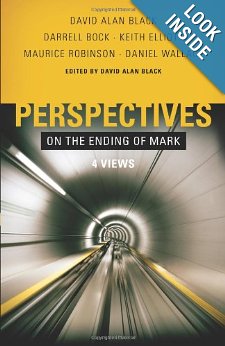
1:08 PM Have you read this? Commemorating the Anabaptists.
12:10 PM Guess where we've been? Well, it seems that some of Becky's best friends felt it would be a good idea for us to get out of the house. After all, our wedding anniversary is coming up, and what better place to celebrate it than in the anniversary suite at Halifax Regional Hospital? So off we went to the ER yesterday (at the bequest of our "friends," the good doctors we know and trust), where Becky was admitted with a severe case of anemia. 19 hours -- and 2 blood transfusions -- later we're back home again. Yall don't realize just how big a miracle that is. Our goal today was to beat Bonnie to the farm, but at a country hospital things tend to work very sloooooowly. After appeals for mercy and grace -- after all, Becky was going to meet the sister she's never seen! -- the doctors managed to expedite her discharge, so now she sleeps comfortably in her own hospital bed at home while I am scrambling to get the house presentable for Bonnie. Becky is eager to show her sister that her face and feet have color in them again!
As I catnapped last night in our hospital suite, I thought, How anemic the church has become! Bart Ehrman's now famous pop quiz is perhaps anecdotal proof of this. Students who claim to be Christians, who grew up in the church, are often biblically illiterate and almost always inadequately equipped to do "the work of the ministry" to which God has called all Christians. In fact, "the" ministry has been redefined to apply only to those who have received a special "call." But beyond that, I think the problem of biblical illiteracy sets the church up for an over-dependency on its gifted "preachers" and for being spoon-fed the truth. This is, of course, the age-old problem of who exactly the New Testament pastors were, and it is here that I think reformation is most needed. As I posted the other day, our concept of "pastor" is such that it rarely encompasses what I see as the New Testament norm, namely believers pastoring each other. An example: You will look in vain in the writings of Paul for a passage in which he addresses the leadership of the church in a way that implies that problem-solving and church discipline falls exclusively on their shoulders. I address this issue in my book Paul, Apostle of Weakness. Pastoral ministries such as warning, comforting, and supporting are functions to be carried out by the whole Body (see 1 Thess. 5:14). Any responsibility of the elders -- take that of teaching, for instance (Eph. 4:11, 1 Tim. 3:2) -- is shared also by the church (see Heb. 5:12; Rom. 15: 14). These facts are nothing new. They are clearly evidenced in the New Testament we read each day.
So how would I go about resolving the problem of anemia? I speak, of course, as a member of a seminary community and a member of a fairly traditional Southern Baptist church. Here's where I would start. If I were teaching pastoral theology, for example, I would put a lot of effort into the exegesis of specific texts from the New Testament. So, for instance, should someone argue that teaching is an exclusively "pastoral" function, I think it would be helpful to examine in detail the passages I listed above in their immediate contexts. Then, on a broader scale, I think it would be helpful to expose our students to the different models of church leadership that are being debated today in evangelical circles. For the Reformed approach, one could read John Owen or the Southern Baptist Frank Owen. In their writings you'll find arguments for the "preaching office." The opposite perspective -- that the New Testament knows nothing of offices -- might be found in the writings of Ellul, Zens, and Yoder. I would expose students to the debates going on in the blogosphere about church leadership. I would especially want to drive them back to the text of Scripture. For example, why should we continue to call 1-2 Timothy and Titus "Pastoral Epistles" when the term is merely a fairly recently-coined scholarly convention? Neither Timothy nor Titus appear to have been the pastors of the churches in which they served.
In sum, if you think the church is anemic, don't just talk about it. And don't just follow your favorite Bible teacher. Above all, don't take anything you read here (or on any website) as gospel truth. The fundamental question concerns our ecclesiology: Is church a place we go to or something we are as the people of God? Are relationships, encouragement, empowering through the use of gifts etc. the primary aspects of our gatherings? Or are we obsessed with church membership statistics and attendance records? Should we take Paul's warnings about salaries seriously? I ask all this in a sincere desire to see the church grow in knowledge and truth. Personally, I know I have a long way to go in this area. At the same time, how do you do this without minimizing the missio Dei?
I'll have more later, but right now I need to pick up the trash on the road near our property lest Bonnie conclude that we live in Landfill County. Thanks for being good cybernetic friends, for listening, and for being willing to engage the issues rather than evade them.
Keep thinking and praying,
Dave
Tuesday, August 27
11:32 AM "I have a message from God for you. You are healed." These words were spoken to Becky. How would you respond? Becky's answer might surprise you. Read I'm Healed!
11:25 AM Thank you, Judy and Mitchell, for your visit today. Judy, we will never forget the sweet care you gave us in the infusion room at UNC for three years. So grateful that God brought us together.
10:28 AM Interested in global missions? Check out these pix from my church.
10:25 AM This email from Ethiopia meant so much to us. Thank you, Alayu, for sending it.
Thank you, it was last Night in the Middle of the Night My wife Kidist called me and asked me about Becky and David, how God is using you to proclaim the word of God, as faithful servant in remote Ethiopian Villages. Dear Becky, even if we know that you are going to home soon to see and be with Jesus, and the heroes of faith, for us still it is difficult to say Goodbye you. Becky you are our mother, sister, mentor, so it is not easy for us not to see you any more to do mission work, to encourage and prepare others for God’s kingdom work here on Earth, that makes our mourning and grief very deep. Dear brother, David, and other family members, pass our love for our beloved sister and mother Becky. Brother David the comfort and the grace of God be with you, as faith full minister of God, what you are doing for your beloved Becky, that is so great.
May God be with you all!
He is, Alayu, He is. Praise His holy name!
Monday, August 26
8:04 PM My thanks to Leigh, Marshall, and Thomas for coming by and blessing us with a visit today. Their presence allowed me the opportunity to get some much-needed bushhogging done today.
In other news, Becky's mom arrives Saturday from Dallas for a two week visit. I am so grateful for this. Thanks to all who pray, visit, and help!
8:55 PM Announcing our contest winners:
Drew and Michael
Books will go out in next week's mail (my secretary is on vacation all this week). Congratulations to both of you!
9:42 AM Last night Becky wrote a letter to her Ethiopian family. Actually, she was too weak to write it; Karen took dictation. Remember, Becky was raised in Ethiopia. These are her people. She has served them selflessly for many years. This is likely her final letter to them. I post it here with Becky's permission:
My dear Ethiopian family. How precious you are to me. The special love between us is a gift that very few faranjis [foreigners] know. It is a special gift from the Lord. How I praise Him for this wonderful blessing that He has given us over these past years.
When I think of each of you, I remember special times that we have had together. Difficult times, funny times, stressful times, happy times; we have truly been family, heavenly family together.
My time on earth is coming to an end according to the perfect plan of God. Many of you write emails to me but I am too weak to answer. I am writing this email by dictation to my daughter Karen. I want you to know that even though I do not answer you are still very much in my heart. I am getting weaker everyday now, I can eat very little, and some days I have much pain. But God is still with me, He has not forsaken me. I am eager to go see Jesus. I want to fall at His feet, I want to hold His ankles, I want to kiss His feet, I want to thank Him over and over for having mercy upon me.
My greatest prayer is that my death would be like Samson’s death. Do you remember the story of Samson? At his death he prayed to God, he asked God to give him strength to destroy the enemy of Israel. God heard his prayer. Samson pulled down the pillars and the Bible says that Samson killed more Philistines at his death than he did his entire life. I want to do more damage to the enemy of our souls at my death than I have during my whole life.
Will you help me do this? I have one last request of you. Let me explain. You know the custom in Ethiopia when somebody dies is to cry loudly, to wail, to do much demonstration of sorrow. Sometimes professional mourners are hired and there is much wailing. This is the Ethiopian way, but it is not the Christian way. At my death we have one last opportunity to show the Gospel to the unbelievers around us. What is the Gospel that we want to show to them? The Gospel is that Jesus has conquered death. The gospel is that those of us who belong to Jesus have no fear of death. The Gospel is that death is just one step in God’s plan of salvation. The next step is the resurrection of the body. God has promised that when Jesus returns those of us who have died in Him will be raised up from the grave. Our bodies will be given a new body, a resurrected body like Jesus' body.
My dear brother and sisters, my dear children in the Lord, how can we mourn and cry and wail and demonstrate sorrow, when we have such a great salvation? If you choose to mourn for me according to the Ethiopian custom you do me a great dishonor and you also dishonor the Lord Jesus. I want you to help me to show the Gospel to everyone around who knows me. All over Alaba, all over Burji, and all over Gondar. I want you to be singing in praise to the Lord Jesus who has conquered death. Do not let them see you cry. If you want to cry you must cry quietly in your own home. It is ok for you to feel sorrow but if you understand the gospel that sorrow is swallowed up with the joy of victory. So I want you to express that victory before the unbelievers and in this way you will help me to have a death that is like Samson’s.
Whatever has come from me and the years that I have had with you, the praise must go to Jesus. It is all his work. It is not my work, it is His work. If you have seen courage in me, it is His courage. If you have seen vision in me, it is His vision. If you have seen grace in me, it is His grace. If you have seen love in me, it is His love. Whatever good you have seen in me, it has come through me from our Lord Jesus and to Him goes all the praise. I look forward to seeing you in heaven, our home. And then I will speak Amharic perfectly and you will speak English perfectly. That will be a wonderful day.
Until that time I encourage you my brothers, my sisters, my children to be faithful. God has answered my prayer to keep me faithful to the end and now I pass that prayer to you. May you serve him with all your heart, with all your strength, with all your money, with all your ability. He is worthy of such service. And when it is your time to come to heaven only such service will have any value to you. Do not pursue the things of this world, do not pursue happiness, do not pursue wealth, do not pursue comfort, do not pursue honor, only pursue obedience to the Lord Jesus.
When someone asks you your occupation you should say joyfully, I am only a servant of the Lord Jesus. It is the best occupation in the world. I think this is the last letter I will send to you. Know that I love you. I appreciate you and I am thankful to the Lord for all the work we could do together for Him.
May His name be praised forever. Amen
Becky/Mama B
P.S. Please translate this letter for all the churches. Thank you.
I thought I'd post here a picture or two to complement what Becky wrote.
1) Here is Becky in Ethiopia.

As you can tell from this photo, every time she traveled to the land of her youth she got down on the people's level. They accepted her as one of their own, and why shouldn't they have? She is.
2) I'm sure glad I snapped this picture in Burji:
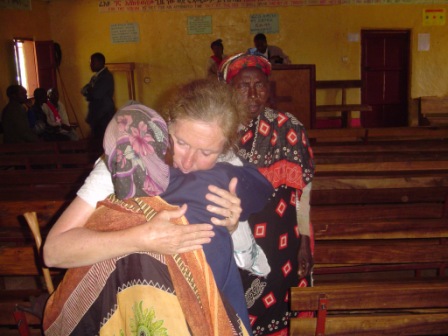
It was during our first visit there in 2004. Here Becky greets women who knew her when she was an 11-year old child. They waited long after everyone else had left the church building so that they could wrap their arms around her. In heaven, of course, there will be no more separations from our spiritual brothers and sisters.
3) Fnally, whenever I speak about missions in churches, I always show show this slide:
Don't you just love it? If only the church in North America could wrap its head around this concept: Missions is not a program or a strategy or a method, and it is most certainly not another silly acronym. Missions is simply people. You just love people, and you love them sacrificially. Nobody knew this better than Becky. Nobody practiced it more genuinely than she.
And now, dear Ethiopian friends, it is your turn. Will you live like the Savior? Or will you pursue the American Dream as so many Ethiopians are doing these days? I can tell you from experience: On the outside, the Dream looks like a white-washed sepulcher. But on the inside, it is filled with nothing but dead men's bones.
Do not pursue the things of this world, do not pursue happiness, do not pursue wealth, do not pursue comfort, do not pursue honor, only pursue obedience to the Lord Jesus.
These are the last words of your dear sister Becky. Will you heed them?
8:54 AM I woke up this morning full of anticipation. I've been doing a lot of praying about Becky's autobiography. I'm praying that Becky will be able to complete it before she goes Home. I'm praying that it would bless many readers here and abroad. I'm praying that readers will realize that God delights to use everyday, normal people for His purposes. Paul got it exactly right when he said that God can do exceedingly far above anything we could ask or imagine. I've had a ringside seat for these past 37 years. Now it's your turn to see, up close and personal, what it's like to share your life with someone as remarkable as our Becky. C. S. Lewis put it well when he said: "To love at all is to be vulnerable. Love anything, and your heart will certainly be wrung and possibly broken. If you want to make sure of keeping it intact, you must give your heart to no one, not even to an animal." Well, for me, this has been the year of the broken heart and the empty hand. My heart is wrung out, but not because I have no hope. Every time I allow myself to become annoyed with the petty little annoyances of life I have to hit myself with the stupid stick. Because when you do become annoyed you're just hurting yourself. You're missing out on the blessing and joy God has for you. Yes, your heart will break -- but you've just got to give it, and then give it some more.
Oh, I almost forgot. Becky's first chapter is called Beginning at the Beginning. I can't remember the last time I read something quite so interesting. But then again, I'm just a bit biased.
Now if you'll excuse us, we've got to summit our next mountain.
Sunday, August 25
6:23 PM Have you been outside today? "What is more magnificent than the beauty of God?" Basil of Caesarea.
4:07 PM A belated congratulations to my colleague Michael Travers, who this past Tuesday was awarded the annual Excellence in Teaching Award at Southeastern. Well deserved honor, my friend!
11:34 AM When together we began our cancer journey 4 years ago, Becky decided she would try her hand at writing her life story, an autobiography if you will describing her family origins, upbringing in Africa, high school and college years, married life and children, move to the East Coast, and the various ministries God has allowed her to be involved in. She has already written the basic chapters; she is now going over them with a fine-toothed comb.

It's hard for me to sit here and try to quantify what that means to me. Few of us have had a life as adventure-filled as Becky's. I doubt, too, whether any of us have experienced the love and favor of God quite like she has. It's no wonder that I am very excited today to begin publishing the fruit of her labors, beginning with the Introduction to her life story. Tomorrow I'll post chapter 1, and then on subsequent Mondays I will treat you to the rest of the chapters, as God gives Becky the strength to finish them. Yes, I am editing her work as we go along, but my touch is light (she loves ampersands; I detest them). This is Becky's story, and in it you will hear her voice on every page, not mine. This is how it should be with an autobiography. (In fact, I am very eager to see how she describes her married life with that young surfer from Kailua.) I've watched with amazement as she has moved her weary fingers over the keyboard of her laptop. You'll forgive me, I'm sure, for saying I've already shed a few tears at what I've been privileged to read. Becky is still storming the gates of heaven for, you see, she is not dying. She has never been more alive.
Well, then, as I said: The Introduction awaits you.
10:50 AM Been a tough day so far. Yet our Valley of Baca (trouble) has been made a place of springs by your emails. You are irrefutable proof that God uses the Internet to encourage the Body. As we stumble long, we keep on drawing after the One who is drawing after us. Thank you, dear friends, for loving us with an undying love, and for encouraging us to keep pressing on and trusting in the Lord who turns our "Valley of Trouble into the Gate of Hope" (Hos. 2:1, NEB).
9:04 AM If you're studying Greek, remember our 24 DVD set is still available. For information, go here. Here's the old geezer himself:
8:44 AM Contest Time! Enter to win a free copy of Christian Archy.*

All you have to do is write us and tell us something you read here at DBO that "edified, encouraged, or comforted" you. (Yes, the entire purpose of our blog/website is found in 1 Cor. 14:3.) There will be two winners, whose names will be drawn from a hat. Contest closes tomorrow night at 6:00 pm. Our email is dblack@sebts.edu.
*I'll even autograph it if you like. That way you can't sell it (ha-ha).
8:22 AM According to Wayne E. Ward, "The Worship of God," in The People of God: Essays on the Believers’ Church, eds. Paul Basden and David S. Dockery (Nashville: Broadman Press, 1991), 68, the earliest Baptist churches in England
... were trying to restore the primitive apostolic form of the church, and, with unerring logic, they understood that worship must be an outward expression of their ecclesiology. Since the "gathered community of believers" was their basic concept of church, all forms of worship, including baptism, the Lord's Supper, prayers, hymns, Scripture exposition, confession, and receiving forgiveness, involved full congregational participation.
"Full congregational participation." How wonderful. This seems a far cry from the spectatorism so prevalent in Baptist churches today.
7:58 AM From Will You Join the Cause of Global Missions?:
Just one generation ago missions was largely the work of large organizations that established "mission stations" in foreign countries. Today, missions is more a partnership between local churches in America with local churches in other nations. We need to repent of our independent, "let's do it our way" mentality. The goal is to build inter-church discipling relationships that last. Unfortunately, many U.S. mission teams fail to coordinate their endeavors with the churches of host locations. Recently a student of mine mentioned that his local church was going to plant a new church in China. I asked him, "Have you ever considered simply going to China and asking the existing churches there how you can come alongside them and help?" Failing to understand and connect with God’s already-at-work global purpose is one of the greatest mistakes we can make as churches. More and more local churches in America are forging effective partnerships with local churches in foreign nations, asking how they can best serve the needs in those countries. When done well, everybody benefits through this kind of beautiful partnership, and Christ is honored as His people submit to one another in love. Much of this work is being done, moreover, apart from top-heavy bureaucracies as more and more U.S. churches realize that, according to the New Testament, the local church is the authoritative sending body of the New Testament missionary (see Acts 13).

7:47 AM One of the main dangers to which Christians are exposed is our tendency to distance ourselves from the world, to forget that theology is not primarily a way of thinking but a way of living. In his book Enigma of the Cross (p. 174), Alister McGrath says it more eloquently than I ever could:
Mission and theology are so clearly interrelated that they cannot be permitted to become divorced in the manner which western academic theologians have become accustomed. After all, in Jesus Christ God himself came down to earth, down to the level of us mortals, and it ought not to be beyond the capacities of theologians to do the same. Theology must come down to earth, to serve the church and its mission in the world -- and if it will not come down to earth, it must be brought down to earth by so marginalising academic theology within the life of the church that it ceases to have relevance to that church, in order that a theological orientation towards the pastoral and missiological needs of the church may develop in its wake.
Contextual theology -- this has become my passion for a good many years now, for sadly the church (and its academics like me) have too often overemphasized justification at the expense of sanctification, redemption at the expense of creation. Such contextualized theology takes seriously the Great Commission of our Lord and Savior Jesus Christ. It has a missional emphasis and locus, even as it pursues deep questions of doctrine. No longer, then, is it possible (if it ever was) to assume that theology can operate apart from service to the world. The more we understand the Scriptures, the more we understand our responsibility to submit our lives and our futures to its radical teachings. Once this is recognized, then global missions will truly be an apostolic focus of the church's apostolic function. Instead of doing theology for theology's sake, we bear witness to the Gospel in both word and deed, by both lip and life. We will, perhaps, also do less pontificating from the ivory towers of the blogosphere and descend to the balcony, and maybe even to the ground floor.
7:37 AM Jesus never entrusted leadership in His church to one individual. There is safety -- and wisdom -- in numbers.
Saturday, August 24
6:42 PM Today I thank God that during this month in 1971 I left Hawaii to begin college at Biola. There I discovered my calling as a teacher. Student friend, what do you anticipate God wants to do in your schooling this year? Set your sights high; you'll never reach higher.
6:32 PM Evening', guys and gals. Becky and I greatly enjoyed the two visits we had today, the first being from a nurse friend of ours, and the second from our three elders at The Hill. I called Robin to stop by and give us some guidelines on how to help Becky with ambulation as she gets weaker and weaker. Robin was chock full of good ideas.
Then we had a wonderful time chattering with Jason, Ed, and Jason. I find that I am especially thankful for the spiritual fellowship we enjoy in Jesus.
We looked back (to what God did during our many trips to Ethiopia together) and forward (anticipating the great things God has in store for our church family and the work in Ethiopia, India, and elsewhere). One of the funniest things we talked about was the disaster that occurred in our kitchen this morning when yours truly tried to make a soft boiled egg for Becky. I suppose there is no place in marriage where true grace is more needed than in the kitchen. You know it's a marred and broken world when you try, not once but twice, to cook an egg and fail.
On a different note, B and I will have a very special visitor next week. We have never met Bonnie. She lives in upstate Michigan. She and Becky have become bosom buddies during the past few years as Bonnie has accompanied us on our cancer journey. She's talked with us and prayed with us and wept with us and rejoiced with us and encouraged us in times of discouragement. It gives me great satisfaction to be able to do this little favor for Becky. I think they'll have a lot of kingdom "business" to attend to next week :)
By the way, somebody is having an anniversary next month, on the eleventh to be exact. Yep. Thirty-seven years. Can't wait!
Enjoy Jesus!
Dave
8:44 AM Recently I had a conversation with someone about family pressure. You know, the kind of negative peer/familial pressure that tries to keep you from pursuing God's will for your life. This issue was recently addressed in an essay called "Family Values." I'll just offer my two drachmas.
Jesus is very clear about what it means to follow Him. Through His teachings, our eyes can be opened to see the divine balance that Christ Himself taught. Once we fully understand the Great Commission and the principles of kingdom living, we will find that life is one unbroken piece of cloth. Every activity, every project, every goal in our lives is to be evaluated in terms of how it contributes to the ultimate mission of God on earth -- global evangelization in our generation. Real faith doesn't come cheap. It cost Abraham everything to serve God. He left father and mother, homes and animals, not even knowing where he was going because he wanted to serve God more than anything the world had to offer. As believers, we are ambassadors sent to this world from another kingdom. We know from Scripture what this entails. It requires a submitted and surrendered will. It requires us to refuse to make any important decision in life without submitting it first for His approval. It requires us to get off the religious merry-go-round by making the kingdom the central passion of our lives. We must be willing to "let goods and kindred go." It means following in the steps of Jesus. We must be willing, as He was, to forsake everything, even family, for the sake of lost souls. The deceitfulness of sin -- often disguised as family "love" -- will keep us from achieving a committed life if we are not careful.
As the essay reminds us, the traditions and wisdom of our society -- including so-called "family values" -- can no longer dictate what we as Christians will do with our time, money, and energy. Many people are hindered in their walk with Christ because of peer/family pressure. But the Prince of Peace came with a sword. He insisted, "Unless you hate father and mother you cannot be My disciple." The American Civil War literally divided families. James Crittenden (whose famous "compromise" failed to avert the war) had one son who became a Union general and another son who became a Confederate general. Abraham Lincoln's wife Mary had seven bothers and brothers-in-law who fought for the South. Officers who fought side-by-side during the Mexican War of 1846 fought against each other during the war of 1861. Captain Robert E. Lee and Lieutenant James Longstreet became mortal enemies of Lieutenant Ulysses S. Grant and Lieutenant Winfield Scott Hancock a mere 16 years later.
Follow Jesus with your whole heart and many will think you are crazy, even perhaps your own family members. But you must obey the Master, remembering the words of Jesus, "He who is not with Me is against Me." Carnal Christians and unsaved loved ones simply cannot understand what Jesus is saying here. But what does God require? I challenge you to read the Gospels and mark every verse where Jesus talks about family. Seek to obey what He says, not merely talk about it.
Friday, August 23
6:22 PM Some days you wonder if you're ever going to get started. We were expecting visitors at 10:30, so I got Becky dressed but she could hardly budge, so tired was she. It was, in a word, "fraught."
Enter Family.
First, Jon and Matthea came and boy what a great time they had with mom. They parked themselves by her bedside and laughed and wept and reminisced about Ethiopia. I parked myself on the bed nearby and just basked in the goodness of the Lord. Then our daughter Rachael stopped by and helped us with various and sundry projects. She cleaned the bathrooms and put up another stencil at Maple Ridge.
I love days like today.
Of course, Becky is exhausted, again. But it's a good tiredness, if you know what I mean. Right now yours truly is getting supper ready. Actually, Karen has it in the crock pot so all I have to do is put on the rice and heat up the okra. I'm tired, but I'm not sure why. Today was not exactly my shining moment as a farm caretaker. Still, I was able to complete three -- count 'em, three! -- projects on my list. Of course, then I added three more, so I broke even, you might say. So I'm just gonna gel tonight with the Fam. I may even get some writing done.
Now wouldn't that be something.
P.S. We finally got Becky on a new breathing treatment today. Seems to be working just swell.
8:06 AM As you know, I have arranged for our elders to pay Becky a visit tomorrow. Will they anoint her with oil? Will they pray for her healing? That's up to them, and the leading of the Spirit. If my reading of Scripture is correct, God is under no obligation to heal Becky miraculously. The physical body is doomed to death. It is doomed because of sin (Rom. 8:10). In contrast, we are being renewed "inwardly" day by day through the grace of God. He may choose to grant a miracle in Becky's case, through the prayers of His people, but I am mainly concerned that both Becky and I be granted His supernatural power to persevere in the trial for His glory and for the good of His kingdom. That said, I find myself asking God to heal Becky's body. I would hate to be found in practice a functional deist who never asks God to intervene in the affairs of mankind. On the other hand, I realize that the prayer of faith offered by the elders is effective only when it is a prayer prompted by the Spirit. The danger, I think, is praying presumptuously, in a way that claims healing without any revelatory warrant. Certainly I hope for Becky's healing. Jesus is no less compassionate today than when He healed the sick in His day. Still, I want you to know that I place no faith in faith. Neither am I content to deal with the problem of pain by retreating into a Stoic ivory tower. I would rather place my hope and confidence squarely in the changeless character of God, whose sovereignty and love I fully embrace.
I think what I really want for Becky -- and for me -- is to live in the reality of His presence week after week, not only as we talk to God in prayer, but as we listen for His still, small voice bearing witness to our groaning. There is great wisdom in the Westminster Shorter Confession: "Prayer is an offering up of our desires unto God, for things agreeable to His will." I urge us all to remember that. The ultimate goal of God's activity in believers today is to conform us to the image of His Son (Rom. 8:29). Therefore, more than anything else, I desire to honor and uphold the supremacy of Christ by submitting my conscience and will to Him, "becoming like Him in His death" (Phil. 3:10), so that His power may be seen in my life.
Is that a prayer you can join me in praying?
Thursday, August 22
2:42 PM I just picked these:
2:36 PM So what's new at our Greek Portal? Here's a sampling:
Abram K.J.'s Greek Isaiah in a Year
Added 8/22/2013
Hughes' The Lukan Special Material and the Tradition
History of the Pericope Adulterae
Added 8/22/2013
Reviews of Timothy Michael Law's "When God Spoke Greek"
Added 8/22/2013
Steve Runge's "Porter's Use of Contrastive Substitution"
Added 8/22/2013
You simply must read the last-mentioned essay. Runge's conclusion? "This suggests that Porter's writings have been treated as primary literature, not as secondary literature that is to be critically tested against the primary literature on which it is based" (p. 25). This is the problem precisely. And it is a good reminder why we must always study the primary data before coming to any personal conclusions.
Well done, Steve.
12:42 PM Just a quick note to let you know what's been happening here. Becky's overall fatigue and weight loss have been having some unwelcome side effects, including wheezing. I'm working with her pulmonologist to see if there is another inhaler she could use. She had only one visitor scheduled for today (yes, I am very protective of my wife's energy), but we had to cancel. Currently she is resting comfortably. I'm thankful for pain medicine. I've got so much I wanted to blog about but there is simply no time right now. Other duties beckon. God is blessing us in so many big ways. But the real challenge I face is just being faithful in the little details of life. That's why I blog, I guess. Not that it matters whether or not anyone reads what I have to say. For me, the very act of writing is cathartic. As I send snippets of my life out their into the far reaches of cyberspace I sometimes wonder, "Will anyone be helped, encouraged, or challenged by what I have written today?" Either way, I will just keep writing. And focusing on God. We are glorious creatures. Our Creator is a genius. He knows every cell in our bodies, the good ones and the cancerous ones. I thought growing up in Hawaii that being a follower of Jesus would somehow make one immune from pain and unhappiness. I figured I'd live a nice comfortable life. But a wiser Heart was at work all along. He speaks, and you never forget His words: You saw how the Lord your God carried you, as a father carries his daughter, all the way until you reached this place (Deut. 1:31). All the way? Yes, all the way. Honestly, the days are sometimes a blur. Each week is an exercise in endurance. Then I remember. He is carrying Becky. Like a father his daughter. Do you see it? He doesn't want us to walk. He wants to carry us. That, dear friend, changes everything.
All together now:
Hallelujah!
Dave
Wednesday, August 21
11:08 AM Our latest project? Stocking the library shelves at Maple Ridge. Putting name tags on all the books is where we start.
Here are some of the shelves we filled yesterday:
Several of them contain nothing but homeschooling curricula:
My guess is that visitors to the farm will be avid readers. Hope they enjoy the library!
10:44
AM
I really enjoyed reading Thomas Hudgin's
Thinking Past the Glosses. Good Bible translation is scarce, and
good Bible translators are even scarcer. Our understanding of Scripture
is often hampered by mis- or under-translation. Not a good thing. A good
translator is a thinker, first and foremost. He or she is a haggler over
shades of meaning. To use Thomas's example, why not use "I'm
dumbfounded" in Gal 1:6 instead "I am amazed"? The other day I wrote a
few German sentences on my blog. It included this sentence: "Man learnt
nie aus!" Literally one could translate this as "One learns never out!"
Idiomatically, however, the sentence means something like "You never
stop learning!" Translators must go beyond the mere dictionary meaning
of a term. A word's role in its sentence must be considered. Did you get
the denotation right? How about the connotative meaning? Worse still,
did you commit the root fallacy? (A Friseur in Germany will cut
your hair, not frizz it.) Let me suggest that translators should never
be afraid of the word "paraphrase." "¿Cuántos
años tiene Usted?" does not mean
"How many years do you have?" Yes, it is a paraphrase to translate the
expression "How old are you?" but a necessary one. Accurate
translation requires more that a word-for-word rendering.
Understand you? (Verstehst Du?)
Tuesday, August 20
3:14 PM Not sure why I waited so long to tell you this, but today Becky has been very weak and in a great deal of pain.
Okay, you know what's coming next.
Please say a prayer for her.
Thank you.
3:10 PM Not that anyone is necessarily interested, but here are a few interviews with yours truly:
-
Matthew Evans, Interview with David Alan Black
-
King's Evangelical Divinity School, Interview With David Alan Black
-
Andrew Rozalowsky, Interview: David Alan Black
-
Jacob Cerone, Why Study Greek? An Interview with David Black
3:02 PM Have you been pastoring lately? No, I did not ask if you are a pastor. Pastoring is not just the work of church leaders we call "pastors." Pastoring is a much broader concept that includes a whole perspective on life. Pastoring (a metaphor) is simply shepherding -- caring for others. In his essay "The Theology of Pastoral Care" (Pastoral Psychology 10 [1959] 21-26), Paul Tillich argued that pastoral care is a universal function. No profession can monopolize it. He went on to differentiate between those who are pastors and those who pastor as follows: pastors exercise this care intentionally and consciously, whereas others do so more casually and unintentionally. In this sense, then, pastoring has nothing to do with religious office per se. All believers can and should be pastoring. Pastors/shepherds may help to facilitate this ministry, but they do not pastor to the exclusion of the sheep caring for each other.
Becky has had numerous pastoral visits in recent days. Sometimes our "pastors" have come. At other times, pastoring brothers and sisters have visited her. Once again, the clerical paradigm fails us in our theology. The care in "pastoral care" should never be limited to ordained clergy. To confuse our "calling" with professionalization is a dangerous thing indeed.
So, again: Have you been pastoring lately?
11:26 AM The bad guys get caught again -- through surveillance cameras. Which makes me wonder what in the world the fire chief of San Francisco was thinking by banning helmet cameras in the wake of the Asiana 214 crash at SFO. To make myself clear, I personally don't feel comfortable having so many surveillance cameras all across the country, many of them used by law enforcement. Yet you have to admit that these devices have proven their real value. In the case of the Asiana crash, the cameras revealed some genuine problems with the fire fighting protocol during the post-crash phase. Remember: here we have passengers frantically trying to get out of the way of the fire trucks approaching the crash scene; then we have the firefighters allowing the entire plane to be engulfed with flames some 15 minutes after the crash; then we have survivors at the end of the runway actually having to call 911 for help a good 20 minutes after the crash; and finally we have firefighters placing an injured 16-year old girl in an unsafe area (rather than taking her to the triage site), incorrectly surmising that she was dead, and then knowingly failing to communicate her position to a fire truck that arrived on the scene belatedly. This truck had no spotter and ran over the poor girl, crushing her to death. Helmet-mounted cameras will be a useful forensic tool in the investigation into her death. I say, let them remain.
11:10 AM Just got an email from a South African interested in receiving a copy of my Why Four Gospels? I'm glad for this interest. The elephant in the room, it seems to me, is the absence of any discussion of the church fathers. Of course, a full account of the patristic testimony would fill several volumes. I have made a partial case for Mark’s Sitz im Leben in my book.
Sadly, the patristic evidence is today hardly known in New Testament scholarship, although everyone claims to regard it with a certain respect. The average person doesn't have a clue because he or she hasn't done the reading. Such investigation would raise questions too complex — and perhaps too uncomfortable — for the sort of subjective and superficial overview one finds in the typical New Testament Introduction.
I myself was ill-taught in this respect while in seminary. Not once were we asked to crack open a patristic tome, and thus I was ill-prepared for vigorous debate on the subject. I don't mean to imply that students of the Gospels know absolutely nothing about the fathers. Certain New Testament scholars were famous for their knowledge (e.g., William Farmer). To become familiar with the field would ask a lot of your average student of the Gospels. In the eyes of some, I suppose, any interaction with the fathers is a subversive menace to the status quo. Those who (like myself) hold to somewhat traditional views of authorship and provenance are sometimes subjected to ad hominem innuendo ("Why Dave, you must be a Roman Catholic!"). Thus protected from all the evidence, many of our students have bought into what I consider to be a highly defective product. To call this merely a "bias" against the fathers is to understate the belligerent emotionality one sometimes encounters. The grain of truth which is the Markan Priority Hypothesis should not mean that we accept the theory without questioning it (the existence of "Q" alone should cause one to pause).
So let the discussion continue and expand. It certainly will in my New Testament classes, where students are exposed to the Mark-Q Hypothesis, Mark Without Q, the Two Gospel Hypothesis, and even the position espoused by their professor (the Fourfold Gospel Hypothesis) — testing and thinking and pondering before coming to a conclusion, their own conclusion.
11:01 AM More on the authorship of Hebrews here.
10:58 AM Just a reminder: If you're in a Greek class that is using my beginning grammar this semester, Jacob Cerone's vocabulary lists will be very helpful. Check them out here.
10:45 AM Speaking of visits, I have arranged for our elders to visit us this Saturday. What a joy to belong to a fellowship where James 5:14 is eagerly practiced.
10:31 AM One of Becky's dearest friends just arrived for a visit. Bec ordered a few new dresses because her other clothes are, well, just way too big for her now. She looks like a million dollars.
10:22 AM In my Paul, Apostle of Weakness I spend considerable shrift discussing Paul's co-worker Ephaphroditus (Phil. 2:25-30). Did you know that Ephaphroditus is the only friend of Paul's whom he describes with three words? These words are adelphon, sunergon, and sustratiotes -- "brother, co-worker, co-soldier." I see here an ascending order, from "fellow believer" to "fellow worker" to "fellow soldier." Ephaphroditus and Paul had much in common. They shared the life of Christ; they shared the work of evangelism; and they even shared the danger.
How many Christians in your acquaintance could you describe with these three terms? To be sure, there are many "fellow believers." But they do not all share the work, do they? And if they share the work, are they willing to risk their lives for the Gospel? I am humbled to say that I have many such friends. The dearest of which is Becky. And why should your spouse not share the danger? Paul clearly says, "Because the time is short, you who are married should live like you're not."
The real message of Philippians is not about joy. It's about priorities, about what comes first and foremost in our lives. "The only thing that matters," says Paul, "is that you live together as good citizens of heaven in a way that the Gospel of Christ requires" (1:27).
So are we?
9:40 AM Have you read this? Living with Resilience.
9:30 AM Over at The American Interest Online, James Kurth has written a piece called Pillars of the Next American Century. There's a lot to chew on here, but especially the comparison the author draws between the U.S. and China -- the world's next global power. And how exactly does China propose to become the dominant player on the international chess board? By a new "New Deal," argues Kurth:
Like FDR's New Deal, the Chinese version centers on large-scale spending on big infrastructure projects like highways, railroads, bridges, dams, rural electrification and public buildings. These infrastructure projects not only provide steady markets and continuing employment for such basic industries as steel, cement, heavy machinery and construction; they also bring long-term productivity gains to the national economy. In contrast to both the Roosevelt Administration in the 1930s and the Chinese government today, the Obama Administration is spending little on new infrastructure.
This strategy is not only brilliant -- it works. I've seen it in Ethiopia. Unlike the U.S., China does not pump millions of dollars of free aid into that nation's sick economy. Instead, it enters into contractual (and well-paying) agreements with the Ethiopian government to essentially build the nation's entire infrastructure, from roads and highways to hydro-electric projects. You have to admire the Chinese for their good, old-fashioned "American" savvy. Read Kurth's piece if you want to understand why Chinese capitalism is working and ours is failing (and is fast fading from the international scene).
Below: The highway between Gondar and Bahir Dar in northern Ethiopia. I snapped this picture in the summer of 2008. Two years before, this was nothing but a gravel/dirt road.

9:22 AM Quote of the day #2 (George W. Peters):
God is a God of missions. He wills missions. He commands missions. He demands missions. He made missions possible through His Son. He made missions actual in sending the Holy Spirit.
9:15 AM Quote of the day (Hudson Taylor):
If I had a thousand lives, I'd give them all for China.
9:04 AM Question for you. In Phil. 2:16 did Paul say we are to "hold fast to" or "hold forth" the Word of life? My personal preference is the latter interpretation because I think it better fits the context ("shining as lights in the world"). Plainly, however, Paul could have intended both meanings (thus making the expression a case of intentional ambiguity). His point, then, would be that while it is important, vital even, to hold fast to the Gospel (i.e., preserve and protect it from error), that is never enough. We must protect and proclaim the life-giving Word. This notion is consistent with everything we read in the Pauline epistles. Paul was no mean theologian, but he was every bit as much a great evangelist, perhaps more so. And, since he invites his readers to share his attitude in these matters, he implies that doctrine is never sufficient in itself, unless that doctrine is applied in practical ways. This dual emphasis upon the sanctity of the Gospel and our responsibility to share it with others is present again and again in Paul. To put it another way, a church should never be centered on itself. Every true Bible church is also a missional church.
Monday, August 19
8:30 PM The rain-soaked farm has now settled into a quiet hush. Today, while Karen stayed with Mama B, Nigusse and I went shopping at Lowe's and Wal-Mart for things needed for Maple Ridge. Then I treated him to lunch at the local Mexican joint. It was fun watching him try to speak Spanish with the server. He needed a bit of coaching but was a good sport. We had a great time getting caught up about life in Ethiopia and here. This evening I've been piddling around with various projects. Here's a bathroom cabinet I put together for the downstairs bathroom.
Tomorrow Karen and Nigu start back to school; both have four classes this semester. One of them they're taking together. Let the sibling competition begin! Becky and I have no plans other than to spend time together. Looking forward to it. May even get some writing done.
Sayonara,
Dave
10:40 AM More from The Authorship of Hebrews: The Case for Paul.
We now turn our attention to the external evidence relevant to the issue of authorship. Beginning in the second century, the history of the canonization of Hebrews and the question of whether Paul wrote it are intermingled. Hence the question of the canonicity of the epistle is dependent somewhat on how we answer the question of authorship. However, it would be impossible to deal with both of these issues in these pages, and I shall have to limit my remarks to the statements of the fathers concerning authorship. To be sure, it has been a common practice nowadays to dismiss the evidence provided by these ancient scholars, since the church fathers can no longer be cross-examined, whereas we have access to all the internal evidence. Nevertheless, the letter is ascribed to Paul by a good number of the church fathers, who, as far as we know, had the best means of information with regard to both its genuineness and its authenticity. In investigating the external evidence, I entertain, of course, no opinion that our brief remarks will render the point in dispute certain. Rather, the question is whether there is not a probability in favor of Pauline authorship that is sufficient to quiet our reasonable doubts. This section, then, attempts to approach the question from the point of view of the external evidence, that is, from whatever can be gleaned from the ancient Christian fathers respecting the epistle's authorship.
10:32 AM A young lady, a stranger to us, sent us this beautiful email today:
Thank you for taking the time to write even in the midst of your trial with cancer. My brother shared your article from July about running to home base. I needed the reminder that life isn't about the next exciting moment, job, vacation, etc. Life is about the Gospel. Being young it is easy to think that I have 70+ years ahead of me. I needed the reminder that none of us knows the day nor the hour we will be called home. We must have Jesus Christ as our focus at all times in life. Thank you for sharing it is blessing others. Death is a topic that few like to speak of but we will all die we all need to hear how to die well. It is such a beautiful picture to hear from a woman who has given her life to serving her Lord and His people, even to the last days. I pray the Lord will continue to strengthen you both in these difficult days.
10:06 AM "As I was returning to earth I realized that I was a servant – not a celebrity. So I am here as God's servant on planet earth to share what I have experienced that others might know the glory of God." Jim Irwin, as he journeyed back to earth from outer space.

9:55 AM A Victorian poet once stated that the church's motto should be simply "Amo" ("I love"). Our job is to prove to an estranged and alienated world that God still loves it and to do so in concrete and practical ways. Missions is nothing but the outgoing of God's love, the giving of it to others.
9:48 AM Read Jacob Cerone's latest essay: THE USE OF γράφω AND ITS COMPOUNDS IN EUSEBIUS. If you're a student of the book of Hebrews, it's a must read. Thank you, Jacob, for this excellent piece. By the way, Jacob is responding to Alan Mitchell's Hebrews commentary in the Sacra Pagina series.
9:42 AM Becky is sick + I am on sabbatical = God's timing is always perfect.
Sunday, August 18
5:32 PM Today Becky is just plain tired. Two hours ago she began coughing and wheezing, then vomiting violently. Again. So we went into our routine: take nausea pill, take more codeine cough syrup, drink tea, clean vomit. This is the story of our life right now. We laugh together, pray together, suffer together. Sometimes I just want to cry out You shouldn't have to be so sick! It's the same aching feeling I get whenever I watch her suffer. And then, when I come to the end of myself, I discover that God is only beginning to work.
When I look closely, past Becky's frail body, I can see the woman I married 36 years ago. She's never been more beautiful. Pray for us that we will be able to see everything through God's eyes. His unwavering love has never left us, not in 36 years. Why should I think it would leave us now?
12:25 PM Becky had no appetite this morning, but she finally allowed me to cook some breakfast for her. She insisted that I take a photo of her tray.
It features Dave's Breakfast Du Jour: Fried egg, yogurt, and banana, along with fresh milk and, of course, a rose (for my rose). The rose has special significance: it's from the bush our daughter Liz planted. And guess what? Becky ate everything on her plate. How does that make me feel? I just feel happy. Bec takes all her meals now in bed. We put her on the scales this morning and she continues to lose weight steadily. We don't know how many days or weeks she has left. I pray that we would use them wisely, that we would be faithful, that we would not grow weary in well-doing -- and there is still much work to be done. Thanks for joining us on our journey. A husband can feel so small, so useless at times. And then your wife eats her breakfast, and you find yourself doing cart wheels.
In one moment this morning, everything was right.
9:16 AM Say, got a minute for some reflection? Today I want to think out loud with you about "hypotheses." As a proponent of the Pauline authorship of Hebrews, all I can do is offer a hypothesis that I believe is consistent with the facts. This does not, of course, prove my hypothesis. That is a different matter altogether. Just because something is possible or even plausible does not make it probable. How, then, do I deal with this issue? You'll have to wait for the published book to see. All I can say here is that an author who defends a hypothesis must be prepared to be judged by the evidence. The estimation of probability is left completely to the reader. The one thing readers must not do, however, is prejudge the matter. Snap judgments are never acceptable. It is a correct critical judgment we are after.
This is true even when a scientific test is applied, say, to the Synoptic Problem. In this case, we know two things: 1) There is abundant documentary evidence from the earliest centuries that Matthew is our first canonical Gospel; and 2) a critical examination of it discloses a high probability of truth. It is therefore not sufficient merely to dismiss this evidence as naive. To put it differently, in trying to discredit this "second-hand" knowledge, the skeptic assumes that he or she knows better than, say, an Origen or a Eusebius. Such a conclusion causes the devil's advocate to point out the utter subjectivity of that position. (See the discussion in my Why Four Gospels? The Historical Origins of the Gospels.) The trouble here is an unexpressed antihistorical bias that vitiates an objective consideration of the data. Who among us has never violated the elementary canon of historiography by neglecting contrary evidence?
In short, I submit that my work on Hebrews is a closely-argued hypothesis. But it remains a hypothesis. At no time should the reader take a vacation from healthy skepticism. The one thing I hope you will not do is prejudge the matter.
8:02 AM Have you read this? My Academic Journey: Confessions of a Limping Greek Teacher.
7:50 AM Our next Indian evangelist:

Name – Pranib Swargiary.
People group from – Boro
Languages known – Boro, Assamese, Hindi
Pranib is from a very remote village from the state of West Bengal. He come from a people group that is very closed and do not like any talks of religion other than their among them. Pranib when he accepted Christ was asked to leave his village and asked not to return or he would be put to death.
Parnib is a very hard working man and a students and would like to work among the people of Assam. Please pray for Pranib.
Oh, the exhilaration that can be ours when we give ourselves totally to follow Jesus as these men are doing!
7:40 AM More about the Anabaptists from The Jesus Paradigm:
Anabaptism went beyond the Reformation in adding to Luther's marks of a church (proper preaching and the sacraments) holy living, brotherly love, witnessing, and suffering. For the Anabaptists it was impossible to speak of faith without practicing sacrificial Christian love. According to the Hutterian Peter Walpot, in Protestantism "each looks to his advantage, to his own favor and greed, that he gathers to himself and fills his sack." Contrariwise, the Anabaptists suffered seizure of goods, lengthy imprisonments, even capital punishment. Why? And why should believers today suffer persecution for the cause of Christ? Simply because believers ought at all times to be prepared to share their possessions, their wealth, all they have, however little it may be, to meet the needs of others. And the greatest need of others will always be the Gospel.
7:29 AM More from my forthcoming The Authorship of Hebrews: The Case for Paul:
The situation in the East requires only a brief summation, since the earliest eastern fathers insisted on affixing Paul's name to Hebrews. The first testimony that we possess comes from Pantaenus, the head of the famous catechetical school in Alexandria, as recorded by Clement, his disciple and successor, in a work entitled the Institutions. This testimony shows (1) that Pantaenus entertained no doubts about the Pauline authorship of the letter, and (2) that he was aware of certain objections against this opinion based on the absence of the usual Pauline inscription. His answer to these objections—that Paul, being the apostle to the Gentiles, out of modesty did not want to appear to be an apostle to the Hebrews—is perhaps a poor specimen of critical reasoning, but this is no confutation of his testimony. Pantaenus does not hesitate in the least to consider it an established fact that Paul was the author of the letter, and there is no reason for him to have held to this opinion save his desire to defend the custom of the churches of his day. Thus it is that the most ancient church, in the most primitive stage of Christianity, received the letter as both Pauline and canonical—a fact to which the head of the first Christian university in the world clearly attests. That Pantaenus evoked an opinion that was general and prevalent at this period cannot be doubted.
Saturday, August 17
9:38 AM Seems that the "study" in "Study to show yourself approved unto God" is a mistranslation. (Go here.) My thoughts, for what they're worth...
The Christian faith is unapologetically intellectual. But 2 Tim. 2:15 is not the right place to go for proof of this. Not that Christians shouldn't study. Augustine once wrote, "Everything that is believed is believed after being preceded by thought." In all of my publications I have tried to show the indispensability of sound logic to Christian living. Christian thinking is anchored in the Scriptures -- hence the necessity of knowing the biblical languages. From the beginning of the Reformation, the church has nurtured an active intellectual life. I reference Alan's post not simply to show how easily we are misled by translations. (We've all had that happen. Growing up in Hawaii I recall making sure to slurp the last drop of grape juice during communion. After all, had not the Savior commanded, "Drink ye all of it"?) My purpose is to remind us just how commonplace misunderstandings can be. The threat is a grave one. It is grave in that we sometimes have those leading our churches whose ability to deal honestly with the biblical texts is obviously in question. Again, to quote Augustine, "Treat the Scripture of God as the face of God." The more profoundly one understands Scripture the more deeply one relates to its Author and great Subject. And vice versa.
So read Alan's post, but do not become discouraged. Let it spur you on to greater diligence and to ever-increasing fidelity to Scripture, to "a thinking with understanding formed by piety" (Hillary). Faith is always the way of reason.
9:16 AM Have you read this? Philippians, Missions, and You.
8:58 AM Joshua Breland has started a new blog called A Return to Faith. Welcome back to the blogosphere, Joshua -- and to SEBTS.
8:52 AM From The Jesus Paradigm:
The New Testament presents a clear picture of how the early Christians viewed themselves. They understood each church to be an extended family (an institutionalized church was unimaginable) that practiced plural leadership. This eldership was non-hierarchical (each elder was equal in authority to all the other elders) and arose from within those churches the elders would lead. Because the Lord Jesus is the head of the church (Col. 1:18), the elders led by example, not by "lording it over" the church (1 Pet. 5:2). The elders' authority lay solely in their ability to "persuade" with the truth of the Word of God (see the use of peitho, "persuade," in Heb. 13:17).
8:44 AM "Many indications are forthcoming that true progress very often means a return to positions which we should have never left." William Leonard, author of The Authorship of Hebrews (1939), who doubted Pauline authorship before examining the data himself.
Friday, August 16
5:14 PM More pix from today's farm work:
1) Over at Maple Ridge the ladies worked on putting up Scripture stencils. This one is still a work in progress:
2) Meanwhile, Nigusse and I had the task of cleaning out all of the barns and outbuildings at MR, including this one.
3) That done, we went our separate ways, he to sweep out the 1790s barn from stem to stern ...
4) ... and I to bushhog the perimeters of our fields in preparation for haying. (Yes, looks like the Lord will give us a second cutting this year.)
Right now Nigu is cleaning his bathroom, Becky is resting, Karen is cooking supper, and I am about to do some writing. Work. Family. Creation. Jesus.
4:58 PM From the introduction to The Authorship of Hebrews: The Case for Paul:
The question "Who wrote the epistle of Paul to the Hebrews?" is, as Ray Stedman and others have quipped, akin to asking "Who is buried in Grant's tomb?" The traditional author, as reflected in the letter's superscription in the Authorized Version, is of course the apostle Paul, but hardly any scholar of late would agree with this traditional assessment. Indeed, that Hebrews is non-Pauline is now considered one of the "assured results" of scholarly research. During my seminary days and well into my graduate studies I adhered to this consensus view. However, Pauline authorship was defended by William Leonard in The Authorship of the Epistle to the Hebrews published in 1939,since which time it cannot so easily be brushed aside. Indeed, a recent study by Andrew W. Pitts and Joshua F. Walker has challenged the consensus opinio by reexamining the raw data, drawing heavily from my previously published work on the subject. Their essay is entitled "The Authorship of Hebrews: A Further Development in the Luke-Paul Relationship." In it they conclude that Hebrews is "Pauline" in a very real sense, Luke having taken a discourse given by Paul in a diaspora synagogue and subsequently publishing it as a written text. They write, "Although Hebrews has been handed down to us without an author, we have argued that both external and internal considerations suggest that Hebrews constitutes Pauline speech material, recorded and later published by Luke, Paul's traveling companion." In my view, this essay marks a milestone of sorts in contemporary Hebrews research. Few have attempted this kind of close scrutiny of the text because it necessitates a highly critical stance toward recent tradition, in this case at least a century of tradition that has rejected the Paulinity of Hebrews. I am grateful for essays like this one. They ask us to "revision" the text in ways that are perhaps more faithful to the evidence, both external and internal. Revisioning is a difficult process. It is difficult because it is hard for us to look past our own traditional blinders in the light of serious exegesis. It can create dissonance between ourselves and our theological heritage. It is fraught with problems and challenges. Yet the rewards can be remarkably satisfying.
In Part 1 of this work we will reexamine the internal evidence for Pauline authorship, concentrating on the letter's language and style, while in a Part 2 we will analyze the statements of the earliest Christian fathers concerning the authorship of Hebrews. Our contention is that there is strong (though not probative) internal evidence and solid external evidence for the Paulinity of the epistle.
The book will have footnotes, of course.
11:46 AM More landscaping for me today, beginning with more mulching...
... and then more tree trimming.
I had an easy time of it, though, thanks to the encouragement of my good buddies Tinish Koi and Tolo Tolo.
THE list is getting shorter....
9:02 AM Guten Morgen! Habt Ihr schon diese Website gefunden -- Your Daily German? Sie bietet hilfreiche Tipps für Wort und Schrift. Es gibt gute Beispiele, die immer leicht zu verstehen sind. Ich habe schon etwas gesucht bis auf diese Site gestossen bin. Sie ist echt super für jeden der sich damit auseinander setzen muss.
Wie alle wissen, ich bin ein echter Deutsch-fan geworden, aber est ist mir immer noch erstaunlich, wie schnell man Sprachen verlernen kann. Man lernt nie aus! Your Daily German ist eine wirklich gute Lösung zu diesem Problem. Sie ist eine perfekte Quelle für alle, die Deutsch lernen wollen.
Was darf ich Euch noch erzählen? Viel Spass!
Dave
Thursday, August 15
8:08 PM The evening sky.
Never has a day ended more beautifully.
5:25 PM Enjoyed these recent posts:
1) In his essay Water, That Is to Say, Spirit, Brian LePort argues for the rendering "of water, that is to say, of the Spirit" in John 3:5. For what it's worth, Brian, I argue something similar in my It's Still Greek to Me (p. 87):
Because a preposition tends to be repeated before each noun in a series of nouns joined by καί, sometimes the non-use of a second or third preposition in New Testament Greek may be significant, indicating, that the writer regarded the terms in one list as belonging together in concept or reality. The phrase ἐξ ὕδατος καὶ πνεύματος in John 3:5 is a possible example: "water and Spirit" together form a single means of regeneration. Similarly, the fact that "God our Father" and "the Lord Jesus Christ" are joined by a single preposition (ἀπό) in the Pauline salutation suggests that the apostle viewed the Father and the Son as a joint source of "grace and peace" (cf. 1 Cor. 1:3).
I might also have translated your French a little differently: "In Greek, the conjunction is usually translated and though it can also have the sense of that is to say" is perhaps better rendered "In Greek, the conjunction usually translated by and can also have the sense of that is to say." (Yes, this is a nit.)
P.S. For more nuanced glosses of the Greek word usually rendered "and" in the New Testament, see Kermit Titrud, "The Function of Καί in the Greek New Testament and an Application to 2 Peter," in Linguistics and New Testament Interpretation: Essays on Discourse Analysis, ed. David Alan Black (Nashville: Broadman, 1992), 240-270.
2) Teddy Ray (a new blogger to me) offers a fine piece called Pastors, theologians, and seminaries -- consider Spanish! He is certainly correct when he argues:
I expect Spanish to be an important language for upcoming theologians. It’s pretty common to see German offered in seminary, and sometimes even French, so you can interact with the bulk of non-English scholarly work of the past few centuries. With the rise of Christianity in Spanish-speaking countries, I could easily see Spanish becoming the most important non-English language for interacting with 21st century theologians.
There is so much good coming out of Spanish New Testament scholarship today (much of it not translated) that I heartily agree with Teddy that Spanish should be learned by all serious exegetes. If you'd care to practice, here's an essay I originally gave as a lecture at the University of Madrid. (By the way, the note on the first page of the essay suggests that the essay was originally given in English and then translated into Spanish. Actually, that's an oversight. The essay was written and presented in Español and later translated into Castellano.)
3) The Biblical Greek Forum is discussing A New Koine Syntax? What say ye Greek geeks?
1:28 PM Just got an email from a close friend who attended an evangelical seminary that is closing its doors next year. A third of all seminaries are in deep financial trouble, according to ATS. I am not a prophet or the son of a prophet, and I even work for a non-profit organization, but one thing seems obvious even to me: seminaries are going to have to adjust to a world gone cybernetic or else fold up. SEBTS will shortly be offering its entire 90-unit M.Div. -- online. At the same time, our on-campus enrollment has never been higher. Please, I am not bragging. It's just the undeserved goodness of God. Plus a forward-looking administration. And a faculty that is willing to adapt its delivery method. Still other seminaries are 100 percent online, though these are often non-accredited.
If not through formal seminary, elders still need training in (among other things) the biblical languages. If you're in that situation, online programs may be the best option. But beware of junk food. Remember too that even a seminary-trained pastor may have had courses in the languages but doesn't actually know the languages. So the question is really not whether we possess a degree. It's what we actually do with our knowledge.
1:08 PM Received a hand-written letter from a prisoner in New York requesting a copy of my intermediate Greek grammar. A year ago I sent him my beginning grammar and he's finished it. Very encouraged. God bless you, Sir.
12:58 PM Guess what? I just took Becky on a hot date. The two of us needed to have something notarized at the local bank, so off we trundled with our oxygen. Afterwards Becky said, "Know what I'm in the mood for? A Big Mac." So we went through the Drive Thru and there she sat in our air-conditioned carriage, eating her burger, sipping her Sprite, just like in the good old days. But our date wasn't over yet. I had to pick up two medications for Becky, so it was back to the CVS Drive Thru where the pharmacists were so glad to see her. Right now we're back at home -- after all, it's nap time :)
By the way, did you notice the fall weather today? The high tomorrow will be a whopping 72. Don't know about you, but I'm ready for the cooler weather.
Blessings on you!
11:33 AM Can you imagine the joy of being reunited with a loved one you haven't seen in months? This video captures it perfectly. (Warning: Get the Kleenex out before you watch.)
I especially enjoyed seeing the kids run into the arms of their daddy. Can't you see Becky doing this when she sees Jesus? Jumping into His arms. Tears of joy. Happiness forever.
Thank you, Jesus, soon she's going home to see YOU. Praise Your name forever.
Wednesday, August 14
8:28 PM Yo folks!
Hope you're all enjoying this wonderful day the Lord has made. Here's a snippet of what my day looked like. I left early this morning for campus in order to get some research done at our library. I left Becky in the very capable hands of Karen and Nigusse. I don't plan on doing this often -- in fact, this is the only research day I have on my calendar this year. I remain very excited about my forthcoming book on Hebrews. I have no idea how God is going to use it, but I have rarely been part of something that was so obviously providential. I am humbled and honored to work with Henry Neufeld in bringing this book to the general public (rather than keeping it locked up behind ivory tower doors). I feel like a detective following a hot trail in a Helen McInnis novel. Scary!
Today I had lunch with a great friend and colleague. Tracy McKenzie (Old Testament and Hebrew) just returned from a yearlong sabbatical in Göttingen, Germany, where he is working on another doctorate. Yep, pretty smart guy.
I was really pleased with how well he speaks German. Soon we'll have to call him "Dr. Dr." McKenzie. Just think, what a great combination: doctorates from both Southeastern and Germany. Reminds me of what President Kennedy said when he was receiving an honorary doctorate from Yale: "Now I have the best of both worlds -- a Harvard education and a Yale degree."
Oh, several of you have asked me if we have started hospice. Yes and no. Becky certainly qualifies for end-of-life care, that's for sure. But we aren't technically in "hospice" mainly because we can still perform all of their services, and perform them well. We are literally surrounded by doctors and nurses and family members taking care of Becky 24/7, whereas the hospice nurse would come only once a week. Bec has a super pulmonologist as well as a fantastic gynecological oncologist, and thus far her husband has been able to keep up with her orders (prescriptions, drainage kits and dressings, oxygen tanks, etc.). Being on sabbatical, of course, really helps. Tonight I prepared for her a hot bath. She cooed and cooed. The bottom line is that we were created for another world. Until then, let's remember that our picture of Christianity is to be rooted in Christ alone, and our attitude toward others is to be derived from His kingdom ethic, period.
Right now Becky is having a snack and reading your emails. Then it will be off to sleep for another night. Her cough seems worse tonight than it has been in several days. Her bowels have also not been up to par. For that reason, I just gave her tincture of opium. Yes, opium. Praying it works.
Maranatha!
Dave
Tuesday, August 13
6:33 PM Good news! The well pump is primed, and we have water again at Maple Ridge. My thanks to our good friend and SEBTS grad Robbie Dunn for his help with this project. Thanks also to our good friend Joel Bradsher for trouble-shooting the AC unit at MR today. I now have a good definition of true love: it is choosing to work outdoors in unbearable heat and humidity. I just couldn't help laughing while watching the water fight that broke out between Nigusse and Robbie's son.
As for Becky, I think I can say she had a pretty good day today. As I said, Joel and Kimberly (with their five sweet kids) invaded the Hall and four wonderful hours had past before we said our goodbyes. Although I know that victory over sin and death has already been announced, I also know that it is a victory yet to be won, so days like today when we are surrounded by love and genuine care sure brighten up our lives. Bec continues to deteriorate slowly but surely. Her weight is way down from what it was only a few months ago. She cannot take a single step without some pretty hefty assistance, and she can only take a few steps at that. The phone appointment with her pain doctor has been postponed to next Monday. I tell you, pain management is a gnarly business, and I imagine it will only get harder as Becky's body weakens and her pain increases. On a different note, I've been getting some writing done in my spare time and I even have a chance from time to time to update this blog. I am so grateful for these little moments of expressing my (limited) writing prowess. One thing I've discovered is that people expect blogs to stay updated regularly, and that's a good thing. The hard part is updating your blog without really having anything to say. The strategy I follow is to try and just be yourself and blog when you feel like it. So far, that's pretty much every day for me, but I don't think I'd be disappointed if I had to go for days or even weeks without writing in these pages. I find myself immensely frustrated with things or people who want to take up your time but fail to realize just how limited your time and energy are. (I'm interested in any suggestions in this process.) I am feeling really connected with the apostle Paul who seemed to be constantly rethinking his priorities in the light of eternity. If it's for the kingdom, if it's eternal stuff, then it's good stuff and I want to be involved with it. But if it's petty stuff, worldly stuff, immature stuff, carnal churchy stuff, no thank you. How we manage our time is one of those issues we all answer either thoughtfully or reactively. I'm praying a lot these days that God would allow me to be proactive rather than reactive in the way I organize my time.
Well, better stop for today. I am so totally proud of Becky. She just hangs in there day after day. It's an incredible reminder of God's grace. The hardest part is feeling so helpless to act. When will the suffering ever end? Not as long as Jesus is in heaven and I am here. In the meantime, prayer is a wonderful place to find serenity.
And so is a blog.
Thanks for checking in.
Dave
8:45 AM Drool alert! New report in from CNN: 22 can't miss U.S. beaches. Just check out #10. This was where I was raised in Hawaii. Forget the rest.
8:33 AM More exciting news here from Energion Publications. Henry announces the titles of forthcoming books in his new series Topical Line Drives.
Here are some of the books that are far enough along in the process that I can announce them. I hope to get catalog pages up later this week. In all cases, precise titles will be determined later.
Forgiveness by Dr. Harvey Brown. Harvey is president of Impact Ministries in Pigeon Forge, TN.
What Protestants Should Know about Catholics and What Catholics Should Know about Protestants, two books by Dr. Robert LaRochelle. Bob is also author of Energion titles Crossing the Street and So Much Older Then …
Holistic Spirituality in James and Process Theology: What Is It? by Dr. Bruce Epperly. Bruce is author of a bunch of books, including Energion titles Philippians: A Participatory Study Guide, Healing Marks, and Transforming Acts.
The Lord’s Supper and The Authority of Scripture in a Postmodern Age: Some Help from Karl Barth by Dr. Robert D. Cornwall, who is also author of Energion titles Ephesians: A Participatory Study Guide, Faith in the Public Square, Unfettered Spirit, and Ultimate Allegiance.
Grief and Mourning by Jody Neufeld, author of Energion titles Grief: Finding the Candle of Light and Daily Devotions of Ordinary People – Extraordinary God.
Hmm, wonder if any of these will become home runs? I hope so!
Monday, August 12
9:44 PM Evening, yall. I want everyone to know that I completed 8 of 16 items on THE list today. This probably has much to do with the problem we're having with our well pump. Try as we might, we just couldn't get the new pump to prime this evening, so it's back to the drawing board tomorrow. As for Becky ... let's just say she's had a rough day today. Spent most of it in bed. But there's good news too. Tomorrow we've arranged a phone appointment with a pain specialist at UNC to discuss her meds. Honestly, this is a huge relief to me. I can't tell you all how blessed I feel to have so many experts working with me while taking care of Bec. So thanks for praying, and for caring.
Tonight I've been working through your emails. Please know that I do try to respond to each one, even if my response is somewhat brief. Number one, I'm not nearly as loquacious as you might think. And two, I just don't have the energy after working 10 hours straight on THE list. Please know that I treasure your friendship and your words of encouragement. I am by every measure a blessed man. I am learning how to love deeply and without reservation. Because without love, nothing makes sense.
I've already prayed with Becky and put her to bed tonight, so I thought I'd post a few pix for her (she can't really get out much these days). So here we go.
1) As you know, honey, I took the scrap metal into town today, and while there I decided to get some mulch for the garden beds and orchards.
2) I hope you like the new look. You've always appreciated a manicured-looking landscape. What do you think?
3) And thanks for letting us borrow your hair dryer for our well pump project today. Made us feel like real Alpha Menschen!
4) While in South Boston I was able to find (finally) fire place grates and tools. The library is now DONE.
5) As is the upstairs south bedroom.
6) Finally, I thought you'd like to see the new reading lamp in the upstairs landing. Hope you like the color of the lamp shade.
I just wish I could show everything to you in person. Maybe tomorrow ....
Sleep tight, my love.
Dave
8:15 AM I loved Richard Zuelch's comment here. He suggests that we should understand John 3 (the Nicodemus story) and John 4 (the woman at the well story) as belonging together. The contrasts/parallels are truly astounding: a man and a woman, a respected Pharisee and a despised Samaritan, Jesus' use of verbal "hooks" in both instances (in John 3 He uses anothen ambiguously, in John 4 He uses hydor zon the same way), etc. Best of all, in the end both become His followers. As Zuelch says, "the two chapters actually hang together as a unit." For more, see Ryan Keams' wonderful essay The Samaritan woman and Nicodemus. A pull quote:
By putting these two stories together we get a glimpse of Jesus’ forthcoming missional movement. As he will command his followers to go to Judea, Samaria and the ends of the earth. It is like a sneak preview of the mission that is to come. It will know no bounds and be for everyone. For the ultra religious and for the outcasts, they all need to be told of the “living water” that Jesus offers.
Sharing the Good News changes lives forever. Isn't that what we Bible geeks should be all about too?
7:58 AM Seen my list of projects for today? If there's a book out there called How to Finish Your Household To Do List Without Resorting to Arson, I'll buy it.
7:55 AM Praying for the faculty workshop today. Great colleagues and friends.
7:48 AM Listen to our Ethiopia 2013 Team Report. I went on the trip -- in spirit!
Sunday, August 11
5:12 PM Read Brian Renshaw's Advice for New Seminarians. Excellent thoughts! I liked #1 the best.
4:55 PM Today in history: Alcatraz opens to civilian prisoners. Alcatraz was originally explored by Spaniard Juan Manuel de Ayala in 1775, who named it Isla de los Alcatraces, "Island of the Pelicans." Never been there? It's a must see the next time you're in the bay area.

4:25 PM David May, a colleague at Central Baptist Seminary, has written a fine piece called "You Cannot Hide the Soul": 1 Thessalonians 5:12-22 (.pdf). Having written on the same section myself (The Weak in Thessalonica: A Study in Pauline Lexicography), I am curious as to what you think about 5:14. May argues that Paul is here continuing to address the church's leaders, since the same term (noutheteo) occurs both in verse 14 as well in the preceding paragraph. I see his point, which agrees with Theod. Mops. (who insisted that Paul "vertit suum sermonen ad doctores"). I hesitate, however. A forceful objection to May's conclusion is Paul's repetition of the vocative adelphoi in verse 14. I wrote:
In the paraenetic section of 1 Thessalonians (4:1-5:22), each time the term adelphoi is expressed (4:1, 10, 13; 5:1, 12, 25), the entire congregation is being addressed.
I go on to say:
In all probability, it is precisely because it appears that these injunctions were the responsibility of the leaders alone that adelphoi is repeated. The word serves to clarify that the following injunctions, like the preceding ones, are given to all and not only to the church elders.
The question, it seems to me, is an important one. The elders' responsibility certainly included admonition, but not at the expense of lay participation. Who is right? How can one tell? What difference does it make? These are questions I would be posing to my students right now -- if I were teaching!
10:28 AM When a certain author wrote a recent book under a pseudonym, it sold only 1,500 copies. When people found out who the real author was, sales increased 150,000 percent. The author? J. K. Rowling.
There are a few authors -- and only a few -- whose works I will purchase hands down, regardless of the subject matter. Harold Hoehner was one of them. When it came out, I knew his commentary on Ephesians would be magisterial. And it was. After all, the man had taught this book at Dallas Seminary for decades. I put is this way in my essay:
But Harold was every bit as gracious as he was scholarly. And he was always fun to be around. Since he knew Swiss German, and since I had once lived in Switzerland, we would banter back and forth in that dialect as others looked on in open-mouthed astonishment. I always asked him what his latest writing project was. I ribbed him that it took him so long to finish his magnum opus on Ephesians. But it was all in jest. I knew that Harold would only write about what he himself had lived. James, Jesus’ half-brother, put it this way: “Who among you is a man of wisdom and understanding? Let him show by the loveliness of his behavior that all he does is done with gentleness” (James 3:13). I wonder, was James thinking of Harold when he penned those words?
It is taking me forever to complete a book I began writing 5 years ago. But that's okay. Harold took forever to complete his magnum opus, but it was worth the wait. Maybe it's just old age, but I'm finally learning that, in the long run, simmering just ain't all that bad.
10:07 AM Just picked:
We love our roses around here.
9:44 AM I hope you're not getting tired of me calling your attention to the evangelists of northern India. Here's the latest update.
Name – Kubesh Ghimirey.
People group from – Nepali
Language spoken from – Nepali, Hindi, Bengali, Nagames and English.
Kubesh is from Darjeeling, West Bengal. He is very talented vocalist and would like to use his talent to bring many to Christ.
Kubesh is open to serve in any part of the northeast India and has a heart to reach and serve a community or tribe of people where the Gospel of Jesus Christ has never been spoken. Please pray for Kubesh and his vision.

Remember: To sponsor an evangelist to receive training at the local Bible school, simply write us and we will get you connected with Mammen Joseph in West Bengal.
8:14 AM My thanks to Joshua Smith for posting a really interesting essay the other day called Luke, the Progymnasmata, and the "Prodigal Son." In it he challenges the consensus opinio about one of the most well-known texts in Scripture. Citing the work of Mikeal Parsons, he notes how Greek grammar and meaning intersect in Luke 15:11-32. Greek students, note the reference to the cases of the noun pater:
We might reasonably expect that the subject of a parable or story would occur most frequently in the nominative case; however, if we take seriously the role of grammatical inflection in the educational system of late antiquity, then we might not be surprised to learn that not only does the word ‘father’ occur twelve times in the parable, it appears in all five cases at least once, and in four cases, including the vocative (a rarity in Luke) at least twice: nominative—vv.20, 22, 27, 28; genitive—v.18; dative—vv.12, 29; accusative—vv.18, 20; vocative—vv.12, 18, 21. The conclusion seems irresistible that an ancient audience hearing Luke 15, who were conditioned (even unconsciously) upon ‘hearing’ a word inflected to identify that term as the subject of the story at hand, would have naturally understood that the subject of the parable was the Father and his love (p.30).
Smith then concludes:
Is the so-called “Parable of the Prodigal Son” a story about a “lost” son who finds his way back home?
Yes.
Is it about the harsh reaction of the older brother as much as the younger brother’s prodigality?
Yes.
But most of all, Luke’s highly refined rhetorical narrative skills would suggest that the parable is about the father who loves both sons—wayward and obedient—equally.
My comments:
1) Few have attempted this kind of close scrutiny of the text because it necessitates a highly critical stance toward tradition, in this case centuries of tradition that have told us that there are three "lost-focused" parables in Luke 15: the parable of the lost sheep, the parable of the lost coin, and the parable of the lost son. After all, could the subheads in our English Bibles and Greek New Testaments be wrong? However, a closer look at the text reveals that the focus in each of these parables is not on what was lost at all. Hence I would rename the three parables as follows: the story of the faithful shepherd, the story of the diligent woman, and the story of the loving father. In fact, whenever I teach from Luke 15, I use these subheads because I think they better represent Luke's theological emphasis in this chapter.
2) If you are wondering why I use the term "story" instead of parable, the answer is to be found in verse 3, where the singular "parable" (not "parables") occurs. I gather that this is not without significance. Luke 15 seems to contain but one parable, though it is told using three stories. The significance of this seems obvious. If there are three parables in Luke, then perhaps we can teach/preach Luke 15 in three messages. But if there is only one parable, i.e., point, then it would be a disservice to the text, and to the author Luke, to fail to present the entire picture. Musicians might think of a "symphony." A symphony has three movements. If you listen to only one movement, have you listened to the "symphony"? No. You must listen to all three movements to get the symphony. Consequently, it seems to me that Luke 15 should be viewed as a discourse unit. Hence, if we teach just one of the stories we will fail to give a well-orbed picture of what Luke is trying to say. One example: the first two stories seem to emphasize divine sovereignty. The sheep and the coin are lost, plain and simple, and there is nothing they can do to "find themselves." They must be found. However, the third story hints at human responsibility. In this story the father's hands are tied, so to speak. He does nothing to "save" his son. He realizes that the son must come to his own senses before returning home. Note the emphasis on the pronoun "I" in the third story: "I will arise, I will say, I have sinned, I am no longer worthy...." An age-old conundrum might well be kept in better balance (tension?) had we taught the entire "symphony" instead of focusing only on the third "movement."
I began this post by saying "My thanks to." I am grateful for blog posts like this one. They ask us to "revision" the text in ways that may or may not be more faithful to the original author's intent. That's for us to discover for ourselves through our own work in the (Greek) text. Revisioning is a difficult process. It is difficult because it is hard for us to look past our own traditional blinders in the light of serious exegesis. It creates dissonance between ourselves and our theological heritage. It is fraught with problems and challenges. Yet the rewards can be remarkably satisfying.
The love of God is expressed toward all. This is Luke's point. Jesus literally "seeks and saves that which was lost" (Luke 19:10). Are we doing the same?
Saturday, August 10
5:25 PM It's always a joy to get caught up with former doctoral students. Here's Alex Stewart in his new office in Holland. For more pictures of Alex and his family, go here.
4:40 PM Read The Conclusion You Want. Well said, well said indeed.
4:30 PM More from Come to the Table (p. 186):
The Lord's Supper is a meal eaten at a table. It is not a sacrifice offered on an altar. Understanding this fundamental difference will reshape the practice of the supper in the contemporary church.
Folks, this book presents some really important information in a very readable manner. Of course, since all churches have their own personality, you'll have to forget a cookie-cutter approach to change. But if ever there was a book to reverse the trend, this is it.
4:22 PM A thousand thanks to Paul, Josh, Brandon, Alana, and Melissa for helping Karen, Nigusse, me, and Becky during today's work day at the farm. To be totally honest, rarely have I enjoyed a day more.
Forgive me, please, but -- pix!
Friday, August 9
7:24 PM Announcing our contest winner:
Dennis Mack
Who writes:
"I grow old but always learn many things". Brother Dave, I like this motto, I may have to adopt this for myself as well.
Your book will go out next week :)
7:20 PM Read Harry Sturz: New Testament Textual Critic.
7:12 PM More on the authorship of Hebrews here and here.
7:04 PM This just came. I am loving it.
Here's just one quotable quote (p. 97):
Whatever reason one might offer for not eating every Sunday, the same reason could be given for not meeting. Wherever reason one might offer for meeting every Sunday, the same reason could be given for eating.
He also notes:
The coordination of the first day of the week, breaking bread and resurrection gives theological substance to the weekly celebration of the Lord's supper as it bears witness to the living presence of Christ within the community.
The living presence of Christ. That's the key! That's why we celebrate the common meal! And that, in my opinion, is precisely where Protestantism misses the boat by replacing the altar with the pulpit and why so many evangelicals today are on the Canterbury Trail.
12:56 PM Today is an anniversary of sorts. It was exactly 4 years ago today that Becky penned the first of her Our Cancer Journey essays. It's called To Go On Living Is Christ. Reading it today brings chills up and down my spine. Here are a few excerpts:
Let me be very clear: I do not long to live. What I long for is that I be useful for the Kingdom of the Lord Jesus. I’m in the same position as the Apostle Paul….I am ready for Heaven, to see His face…but if I can be useful for the Kingdom, to help believers (including my own family) grow strong, to influence others for Jesus, then I am willing and happy to remain on earth a while longer.
And this:
This does not mean that tears are not shed. Tears have been shed, and will be shed again. When Paul met with the Ephesian elders and said “good-bye” to them, tears were shed; he knew he would not see them again on earth. When the Lord Jesus was living, He cried; although only one instance of His tears is recorded in detail, the Scriptures call Him “man of sorrows and acquainted with grief.” When we cry, it is not a demonstration of lack of faith; we do not cry in despair. In the midst of our tears is a certain calm, an undercurrent of rest in His character, a sweetness of spirit that is founded upon His love.
Finally, this:
It is our desire that as we walk through this “shadow of death” the Lord Jesus be lifted up and glorified. He will be glorified as we affirm Truth in the midst of difficulty. In the coming weeks/months we expect many days of physical and emotional pain, times of spiritual assault as the Evil One bombards us with falsehoods, hurting comments by spiritually-distracted people, periods of feeling abandoned and alone. But it is our resolve to lay hold on the Truth of the Scriptures, to discipline our minds, to affirm His character – and in that exercise to bring glory to His Name.
I have had the incredible experience of accompanying Becky on this 4-year journey. She's always had a smile, a smile that hasn't been diminished even when the skies turned dark and ugly. And so we travel on, buoyed by your prayers, surrounded by angels we can't even see, filled with the peace of God and the comfort of the Holy Spirit. Wherever we go from here, it is not we who hold our lives. There is Someone much stronger, much more capable of making sure that each little step gets taken.
Take time to read Becky's thoughts if you can. Share them with others who may be traveling a similar road. As Becky says:
We are "going public" with my situation in an attempt to increase awareness, not of the medical condition, but of the wonderful Lord Jesus, and to increase discussion of Him and His wonderful salvation.
To quote the Psalmist: Amen.
11:58 AM Any barrister knows the importance of an opening statement. One's first words are often crucial to the eventual outcome of a trial. It is a moment when the jury can be swayed by initial impressions. A dramatic and persuasive opening gambit might open doors that the jury would decide to walk through when the judge dismisses them to the jury room.
I believe that the author of Hebrews had a similar task. He had to fire up his readers with his own passionate conviction that Jesus is "better" -- better, in fact, than their former religion. His audience must believe in this as strongly as he does. Polymeros kai polytropos, he begins. The alliteration with pi must have elicited grins. "...just as the name He inherited is greater than theirs." This time there were murmurs of approval. It was only the beginning of a long, well-reasoned argument, one that would appeal both to the ear and to his audience's logic. The author pauses so that his next words would sink in. "For to which of the angels did God ever say...?" And thus his "word of exhortation" proceeds, climaxing in a superlative benediction.
Many scholars insist that the apostle Paul could not have authored such a masterful treatise about Jesus. I hope that my forthcoming book on Hebrews (now kindly mentioned here) will show that they are quite possibly wrong. At the very least I hope it will jumpstart the discussion. God knows. All I know is that it had to be written.
11:32 AM Good morning, all ye thoughtful bloggers out there! Here's more about "movements" from a reader who sent this email:
I was glad to see your post about this. Wendell Berry has frustrated many by refusing to ally himself with any movement, or even to tone down some of his views for the sake of the "greater good". He's one of my heroes for that.
I assume you're aware that Dietrich Bonhoeffer also wrote about movements, but if not here's a powerful passage from the first chapter of his book Life Together:
"God hates visionary dreaming; it makes the dreamer proud and pretentious. The man who fashions a visionary ideal of community demands that it be realized by God, by others, and by himself. He enters the community of Christians with his demands, sets up his own law, and judges the brethren and God Himself accordingly. He stands adamant, a living reproach to all others in the circle of brethren. He acts as if he is the creator of the Christian community, as if his dream binds men together. When things do not go his way, he calls the effort a failure. When his ideal picture is destroyed, he sees the community going to smash. So he becomes, first an accuser of his brethren, then an accuser of God, and finally the despairing accuser of himself."
This is simply marvelous. In addition, I see that David Dunbar, president of Biblical Seminary, has penned these thoughts about movements:
I am not a movement kind of guy, whether we are talking about religious movements, or political movements, or . . . whatever. I have numerous reasons.
1. I find that most movements attract a certain number of followers with wacky ideas. These wacky ideas quickly get associated with the major tenets of the movement and subsequently attributed to all the followers. Count me out.
2. Zealotry also becomes a problem. The cause advocated by the group tends to become all-important and all-consuming in a way that leads to excess. Part of a healthy life (including a healthy spiritual life) is balance, and joining a movement is a strong encouragement to imbalance . . . not always, but you get my drift.
3. One particular manifestation of this excess is the move toward certainty. Movements frequently develop cultures that drift increasingly from dialogue to dogmatism. The opinions of the group are no longer debatable—they are affirmations of absolute truth which no right-thinking person would question. Those outside the movement frequently perceive this dogmatic stance as arrogance; however, for those inside, it is merely a deep commitment to that which self-evidently the TRUTH.
4. Certainty leads easily to the assumption that there are two kinds of people in the world: those who know the TRUTH of the movement and those who don’t; those who are right and those who are wrong; those who care and those who don’t; etc. In other words, there is frequently a lack of nuance.
5. The previous characteristics contribute to a further dynamic which is the reason for this blog. I would call it “circling the wagons.” This is a defensive maneuver frequently deployed anytime a representative of the movement comes under criticism, even if the criticism is one not directly related to the tenets of the group. The psychology of this response seems to be something like this: Any member of our group is obviously on the side of the angels—they surely see and adhere to the TRUTH as do we. Therefore, it is highly unlikely--not impossible perhaps--but HIGHLY unlikely that any criticism of our ideas, character, or behavior has any merit. It may in fact be just an effort by the opposition to destroy the credibility of our movement.
I hope the discussion about movements will continue in a healthy way. And no, I am not trying to form a movement against movements.
Thursday, August 8
6:38 PM The captain of the Italian liner Costa Concordia abandoned ship soon after realizing that the vessel was listing dangerously. During questioning by magistrates, Captain Francesco Schettino claimed that he fell into a lifeboat while investigating the state of the ship. Later he refused appeals from the Coast Guard to return on board in order to save passengers. "You go aboard. It is an order. Don't make any more excuses. You have declared 'abandon ship'. Now I am in charge. You go on board! Is that clear? Do you hear me?”

I was stupefied as I watched all this. How could a ship caption do such a thing? But then I asked myself, "Are we Christians any different?" Will you and I do our duty as Christians to tell the world about Jesus? Or will we make excuses?
The mission of the church is world evangelization. In Mark 16:15 our Lord commands us, "Go into the entire world and preach the Good News to every person." Nothing could be clearer: Go everywhere and tell everyone. The Great Commission leaves us no option. Our first task as local churches is to extend the kingdom of God to every nation on earth, including our own. Everything else must be subordinate to that cause. Every time we are considering a new plan or a new program or a new building we must ask the test question of every decision: Is this helping to fulfill the Great Commission on this earth or not?
6:32 PM I've been reading Wendell Barry's powerful essay The Distrust of Movements. Wow. It addresses a real need. As you know, single-issue movements have become all the rage these days. My system of church planting. My list of the marks of the church. My agrarian philosophy. (Agrarianism is a huge movement among certain evangelicals.) Or how about this? An exodus from the public schools is a desideratum. You need to read Barry's essay. Lots can go wrong with all of our ephemeral "movements." If our cause is too narrowly focused, we very well might find ourselves focusing on the temporal at the expense of the eternal. I argue a similar point in my Christian Archy.

Folks, let's let the kingdom be the kingdom. There is only one archy, and it ain't ours!
6:12 PM Contest time! The first person to correctly translate my "new life motto" (see below) will win a free copy of Rethinking the Synoptic Problem! Contest ends tomorrow night at 6:00 pm.
5:58 PM Boy do I feel like General Lee sometimes. Exactly 150 years ago today he wrote these words to President Davis:
No one is more aware than myself of my inability for the duties of my position.
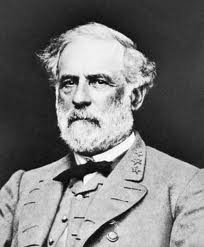
The letter, written after the defeat at Gettysburg, included his resignation. It was, of course, denied.
What does this say to me about my own life today? With monotonous regularity the greatest Christians all tell us that they have great feelings of inadequacy. The fact is that none of us is truly adequate for any task God gives us. If it is true, as Paul said, that we have these treasures in earthen pots of clay, then our first need as disciples of Christ must be to acknowledge our weakness.
And then?
Accept that each day's tasks and frustrations are God's means of making us stronger. Allow Him to display His strength in us. Great is the power of God in the lives of those who admit "I can't." Intense distress at one's continuing imperfections is a sign of spiritual health. Lee's "my inability," like Paul's "wretched man that I am," are the words of a spiritually robust individual who is wise enough to realize that true strength does not come from within but from Another.
My friend, never let anyone divert you from holding this truth in your hearts.
8:38 AM My new life motto (Solon):
γηράσκω δ᾽ αἰεὶ πολλὰ διδασκόμενος.
8:24 AM Around the blogosphere:
1) Excellent piece here called The Purpose of Philippians.
Here is my own summary, which is probably quite close to Fowl: “Paul seeks to show the church how to perceive, assess, and respond to its circumstances ‘in a manner worthy of the gospel of Christ’ (1.27)—namely, in a way that rightly grasps and appropriates the gospel’s eschatological trajectory, missional priority, and cruciform morality.”
This is so right! The letter is all about the Gospel, to wit:
-
eschatological trajectory = live for the kingdom!
-
missional priority = put the Great Commission first!
-
cruciform morality = the way up is down!
For more, see my The Discourse Structure of Philippians: A Study in Textlinguistics.
2) Need some Greek Geek Advice? Here it is, in a nutshell:
1. Read, read, read the Greek NT and Apostolic Fathers.
2. Take Dr. Varner’s 2 Peter/Jude class being offered this Fall. Even if you’re class load seems crazy, take it.
3. Carry your Greek NT everywhere.
I like #3. I even know some Greek profs who take only their English Bibles to chapel (not at my school, of course)! Great advice. Heed it!
3) Danny Slavich on the significance of the one table of the Lord.
There is only one Table. Jesus sits at the head, and we gather around, together, equal, a family. We have different seats. We occupy different parts of the table, but it isn’t segmented like booths at McDonalds. It’s a family dinner table, a level playing field.
4) Okay, this last item isn't in the blogosphere. Consider it a DBO exclusive. Yesterday Nate and Jessie had another boy, as yet unnamed. The vitals: 5 pounds 15 ounces, 19 inches, 4 weeks early. Everyone is doing fine, praise God. Congratulations, Black family!

Loved this photo:

Reminded me of a TV show we used to watch in the 60s.
Wednesday, August 7
7:08 PM So... how are things on the farm? Well, we are praising the Lord. We had a fantastic trip to UNC today. They did a sonogram, and it showed Becky's catheter working fairly normally. That being the case, we just have to accept that the amount of fluid we're draining from her right lung is diminishing. That's a good thing. The un-silver lining is that without fluid in her pleural cavity, the catheter tends to cause some pretty serious pain, as in "I need two Percocets now" kind of pain. So the Lord gave yours truly a brain trickle. "What if, instead of draining as much as we can at one time, we left a little bit of fluid in your chest cavity, you know, a sort of buffer zone for the catheter to float in?" Becky thought it was a great idea and so did the doctors, so we'll try that for a few days and see how she does. As for Becky's strength, it is clearly waning. She can still take a few steps by herself, but not many. Otherwise she is pretty much limited to her bed, chair, or wheel chair. She stays on 4 liters of oxygen during the day, though we can reduce that down to 2 liters at night. What I hate the most is watching her cough her dear brains out (which is hardly surprising, considering everything she has going on in her lungs), though last night she didn't cough at all. Tonight, by the way, she has two of her daughters over to spend the night with her. Count 'em -- two. Life don't get no betta.
So there you have it. Everything you wanted to know about your favorite Virginia farmers but were afraid to ask. Life goes on, though with a "new normal" practically every other day. As I said, God has been so good to us. We are praising Him with all of our hearts. We just continue to walk with Him, our hands securely fixed in His. He's never let us down and never will.
Thanks for stopping by -- and for praying.
Below: A gratuitous picture of Dave and Becky.

10:07 AM Are you worshiping God with your mind? Well said, Craig, well said!
9:08 AM Speaking of the etymology of ekklesia, here are two interesting uses of the verb ἐκκαλέω in the Septuagint (the verb only occurs twice in the LXX):
1) Gen 19:5 καὶ ἐξεκαλοῦντο τὸν Λωτ καὶ ἔλεγον πρὸς αὐτόν Ποῦ εἰσιν οἱ ἄνδρες οἱ εἰσελθόντες πρὸς σὲ τὴν νύκτα; ἐξάγαγε αὐτοὺς πρὸς ἡμᾶς, ἵνα συγγενώμεθα αὐτοῖς.
2) Deut. 20:10 Ἐὰν δὲ προσέλθῃς πρὸς πόλιν ἐκπολεμῆσαι αὐτήν, καὶ ἐκκαλέσῃ αὐτοὺς μετ᾿ εἰρήνης·
How would you translate these verses?
8:58 AM Just ordered Nigusse's fall textbooks. In one of them, there's a chapter titled "Your Calling in the Church." As you can imagine, I read it with great interest. Under the subhead "Called and Ordained," the author made this statement:
One pastor told me that he has not done an evangelistic call in years. He has a committee of laypeople to do that. Nor has he done any hospital visitations. He organized a group of laypeople to visit shut-ins and people in the hospital. Laypeople lead all of the Bible studies and Sunday school classes. They conduct prayer groups and plan the worship services.
Hmm, sounds to me like this pastor is doing his job well -- if, of course, we understand his job to be one of "preparing God's people for works of service" (Eph. 4:12). If anything, the fellow deserves a good pat on the back, even though I would have preferred that he had gone out with the people and served alongside them. However, our author goes on to make this statement:
In other words, he has laypeople do what he has been called to do -- evangelism, caring for his flock -- while he is doing what laypeople are called to do -- handle the day-to-day, practical institutional details.
I get what he's saying. His model of church leadership is one based on a distinct clergy-laity distinction, a distinction I do not espouse because I do not see it in the Scriptures. His model of church leadership also seems to imply that the church is an institution and that this institution is to be led by a single pastor. Again, I disagree with this model because I find no Scriptural support for it. I have never been a pastor. I am not an elder in my local church. This has never stopped me from doing personal evangelism or hospital visitation or teaching or singing in our local nursing home or going on dozens of mission trips as a "layperson." Nor should it. Ministry is by all, to all. According to Ephesians 4, each member of the Body of Christ is to do his or her part until it attains "the measure of the stature of the fullness of Christ" (4:13). This is accomplished not only by gifted individuals teaching the Word of God but also by each believer employing the "gift of grace" that God has given him or her (4:7). As far as the goal of edification is concerned, Paul says that every believer has a contribution to make. Paul pictures the church as an organism in which each member contributes to the growth of the whole, a process that takes place "according to the effectual working in the measure of every part" (4:16).
Notice how Paul addresses himself deliberately to "every" believer. This isn't an insignificant detail. Paul seeks to drive home the truth that every believer has a special service in the church. Every saint is to make his or her own contribution to the mission and unity of the church, all cooperating according to their ability. This truth is also evident in 1 Cor. 14:26: "When you assemble, everyone has a psalm, teaching, revelation, tongue or interpretation. Let all things be done for edification." Unfortunately, many Christians meet together on Sunday without ever "assembling" as the Body of Christ in this manner. But Paul is clear: every believer has a ministry, and everyone is to participate and give to others what God has given them.
Perhaps the time has come to bring our local church practices under the scrutiny of God's Word. If there are practices in our tradition that are in conflict with the New Testament revelation, then we have only one option, and that is to correct our practices. The Bible clearly rejects our clergy-laity divide. All members of the local church are to function in the body according to the grace given them (Rom. 12:1-8). The church is a temple in which every Christian is a priest who offers spiritual sacrifices to God (1 Pet. 2:5, 9). According to the New Testament, all Christians do the work of ministry through the exercise of spiritual gifts. Whatever legitimate distinction can be made between leaders and led (and there is a distinction -- see 1 Thess. 5:12-13) does not negate the fundamental truth of the priesthood of all believers.
8:24 AM Read You've Been Duped! Ekklesia Does Not Mean "Called Out Ones."
Tuesday, August 6
7:25 PM Just a couple of quick notes:
1) Becky's not been doing well of late. Short version? She's been having terrible coughing spells, has been wheezing (which is new), and her pain at times seems out of control. I'm absolutely, terribly concerned about her. In addition, her catheter is still not working properly. So I'm taking her back to UNC tomorrow for a sonogram. Your prayers would be appreciated. Stay tuned!
2) I just published an essay called Introducing Bradford Hall and Maple Ridge (which I blogged about earlier). Please feel free to copy and distribute it, or send the link to your friends. Can you think of someone who might need a place to stay for up to 6 months? Think of that pastor and his family who have just been told they have a week to vacate the parsonage. Or that missionary family on stateside assignment that needs some R & R. The sky is the limit. Maple Ridge is ready! It marks the completion of many months of hard work. Look for an announcement of its dedication service soon.
3) I am very excited about my forthcoming book on Hebrews. It's not the first time I've felt really good about something I've written, and I hope it won't be the last. You're probably already getting tired of hearing me saying it, but I just can't believe this is my life. God is at work in this breathtakingly beautiful world, and I plan to bear witness to that as long as I possibly can!
Thanks for moseying by -- and for praying.
4:38 PM While we're talking about education, have you seen Thomas Hudgin's latest post "So Are You the Actual Professor for the Course?" Here's a pullout:
I'm convinced that we have to be accessible to our students, and we have to take an interest in them personally as well as how they are serving our Lord Jesus Christ.
Students, this is great advice. Get to know your profs. I recall my first semester at Talbot. I invited each of my profs our for lunch to get to know them better. Yes, even my Hermeneutics professor. And what a difference it made in our relationship. I'm not saying to cozy up with your profs. Just get to know them. You might have to take the initiative!
4:12 PM Chuck Lawless (my dean) has a new essay up at The Christian Post called 8 Ways to Become a Great Commission Christian. Great stuff!
4:06 PM Just starting seminary? Read What I Learned During My First Semester In Seminary.
3:56 PM Usually about this time I would be talking to you about my fall classes and how excited I am to be back in the classroom. This fall, however, I will be on sabbatical (in fact, for the entire year), so my comments today will be a little different. You can be sure I'll be praying for all of my colleagues and the administrators who lead the seminary. I can't tell you what it means to work beside them in a seminary that is truly a Great Commission Seminary. I'll also be praying for the students the Lord sends our way this semester. You know something? Jesus is not looking for cheerleaders. He's looking for athletes who will get into the fray and play the game. Students love to read, will gladly sing about the Savior, and even pray about missions, but where are the ones with the servant spirit who are willing to get involved with their whole lives? This is what God wants His people to embrace today. He is challenging us to join a fellowship of believers who realize that the only real truth is truth that is lived out. How sad to see so many today who are educated beyond their intelligence! What a contrast from the Spirit-filled service of a surrendered saint. Students -- are you ready to do the work of the Gospel, and not just talk about it? Are you willing to see yourselves as unknowns, unrecognized, unappreciated, willing to work behind the scenes? Are you willing to stop chasing your own ecclesiastical dreams, ambitions, and plans? Are you ready to stop playing academic games? You cannot love God and the world,. There is no middle ground. Servanthood is simply giving back to God what is already His. I am boldly asking you, even during your student days, to choose a life of total surrender because this is the New Testament requirement for Christian living.
And something else. If you really believe that complete surrender is the minimal response we can offer to the love of our Creator, I've got a book for you. Just write me for a free copy of Will You Join the Cause of Global Missions? and as long as my supply lasts I'll see that you get a copy. This goes for students anywhere in North America, not just at SEBTS. I'm convinced that if we would adopt this kind of radical lifestyle, we would turn our world upside down for Jesus in a generation. It must be done, and by God's grace it can be done.

So, to all of my colleagues at Southeastern, and to all our students, have a blessed semester. I'll miss seeing you, but I will never cease praying for you. I believe with all my heart that God has something special for you to do in this great work of global evangelization.
Blessings,
Dave
10:42 AM Dietrich Bonhoeffer:
The Church is the Church only when it exists for others. To make a start, it would give away all its property to those in need. The clergy must live solely on the free-will offerings of their congregations, or possibly engage in some secular calling. The Church must share in the secular problems of ordinary human life, not dominating, but helping and serving. It must tell men of every calling what it means to live for Christ, to exist for others.
10:40 AM From The Jesus Paradigm:
I would like to begin with an observation I made during a recent mission trip to Ethiopia. Pastors there are experiencing burn-out at a rate similar to that in the US. As in America, the pastor is considered the religious professional, the expert, not the equipper and catalyst. He is expected to do the work for the “laity,” not the one who transforms the “laity” into ministers.
Let me be clear: This approach to ministry is nothing less than pathological. We are talking about a devastating form of ill health in Christ’s Body.
The biblical understanding of the church is truly revolutionary. All believers are priests and therefore ministers (Rev. 1:6). The people we call “ministers” are not appointed by Christ to do the work for the members, but to prepare them for their work, so that the whole church may be built up. Each member of Christ’s Body has a task to perform. The description of the church that Paul provides is a far cry from the clericalism and professionalism of our day.
In chapter four of Ephesians Paul says that every member of the church has a work to do, and for its accomplishment every member has a share in the inexhaustible grace of Christ (4:7). The grace that saves also grants power for ministry! Indeed, only on the basis of the ministry of all Christians has God promised that the church can reach maturity (4:11-16).
What, then, is the role of the pastor-teacher? Pastor-teachers are God’s change agents for the flow of dynamic energy for spiritual growth. They are not CEOs but catalysts for equipping the saints. “Equipping the saints” is, in fact, the heart of the pastoral ministry. Spending time and energy on other things is a misuse of their calling.
This is precisely where so many of my Ethiopian – and American – pastor friends struggle. Rather than following the biblical principles and patterns of New Testament church leadership their tendency is to acquiesce to the expectations of their peers, thus promoting the unbiblical division of God’s people into an elite class of “ministers” and a vast second-class body of believers known as “lay people.” Rather than encouraging and teaching each part to do its work in the Body, they pile responsibilities on a few with special gifts for organization or promotion. As a result, the institutionalized church blinds believers to many potentially kingdom-building ministries.
10:27 AM This email arrived today:
Dave,
A thought on the status quo - when I spent some time in classes in 1994, we were taught, as plain and simple proven fact, of the existence of Q, and its priority. No arguments for and against, no scholarship, no details - just Q is what scholars have proven to be right. I lived with this for many years, and only recently as I have embarked on my own scholarly journey (weak as it is right now), have come across anything but this 'fact'. I wouldn't be surprised if my teachers at the time were taught the same thing in the same manner...
Do you think this is part of the problem?
This was my response:
This is why I have been harping on groupthink lately. I have no doubt that my own seminary professor taught Markan priority because he was a graduate of the same seminary, where the established position was such. The same, I believe, could be said of any number of other debated topics. In fact, I began my teaching career espousing the status quo on all of these issues. But the rascally side of me told me if everyone thought the same way, there must be something fishy.
Ad fontes! is a cry we often make. But do we really practice it? Nope. Too busy. Too indifferent. But truth is truth. It's out there, waiting to be discovered. And what an exciting hunt it is!
I surmise that you too have a rascally side. Good for you. If so, don't be afraid to indulge it from to time. You might be pleasantly surprised at what you find at the end of your journey.
Ad fontes! Slogan or reality? You must decide for yourself.
Monday, August 5
12:38 PM "It is very difficult for many American Christians even to conceive the possibility that American civilization is profoundly anti-Christian, precisely in those very places where it is most pious, patriotic, and full of noble sentiment." Michael Novak.
12:34 PM Anabaptist lovers -- check out this essay called The Prophetic Political Dissent of the Anabaptists – Then and Now. "Then and Now" posts are some of my favorites.
12:22 PM I've been on at least three websites in the past few days with fresh posts about the synoptic problem, espousing, of course, the Markan Priority Hypothesis. The status quo remains unassailable, it seems. My own criticism of this formulation is scattered throughout my Why Four Gospels? The Historical Origins of the Gospels.
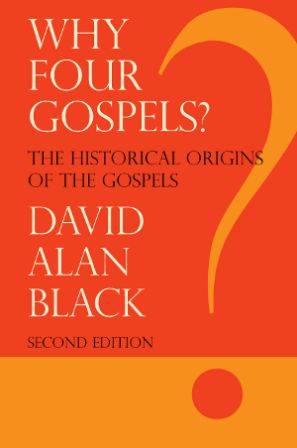
Now it is entirely right and natural for Christians to desire a comprehensive solution to the synoptic problem. But is the dominance of one hypothesis, in and of itself, an index of good academic health? With little or no evidence for the existence of M, L, and Q, no, it is not. Whether you are just starting out or an old hand at biblical studies, you need to rethink the wineskins on this one.
12:10 PM Here's another snippet from the book I'm writing, Godworld: Enter at Your Own Risk:
In my book Paul, Apostle of Weakness, I talk a lot about Paul's "thorn in the flesh." No, I couldn't unravel the mystery surrounding the nature of Paul's thorn. It must have been painful. It must have caused Paul to despair. But to Paul's "I can't do this" came Christ's "Yes, you can! You can do anything in union with the One who gives you strength!" But here's a new thought, one I had never noticed before. It seems that Paul's greatest fear had nothing to do with his physical health. I think he was worried about seeing his ministry come to an end, his life's work shrivel up and die. It appears, then, that Christ's words "My grace is enough, because My power is perfected in your weakness" had profound implications for Paul's apostolic calling. It's as if the Lord were saying, "Look Paul, I am refusing to remove your thorn, not because I don't love you, not because I want to see your ministry come to an end, but because I want to see that your ministry goes on in power you've never experienced before." Paul's thorn became the opportunity for God to display His power for the praise of His glory, not Paul's. The takeaway? Whatever our weaknesses may be -- depression, stress, ill health, broken relationships, exhaustion -- God desires to sanctify them by enabling us to become more useful for His service than ever before.
More to come ....
8:32 AM Here's our second evangelist from northern India:

Name – Nepolion Kisku
People group from – Santali
Languages known – Santali, Bengali and Hindi
Nepolion is from a very remote village of the West Bengal – Bihar border region. He has been the first from his community to come to the seminary to study God’s word. Once he completes his training here he would like to go back to his community and reach the unreached community of his region.
Please pray for Nepolion.
Yes, please join us in praying for Nepolion.
8:00 AM "No clever theological moves can be substituted for the necessity of the church being a community of people who embody our language about God, whose talk about God is used without apology because our life together does not mock our words." Stanley Hauerwas and William Willimon.
7:48 AM "Leadership is only worthy of allegiance when the led freely grant it to the leader in response to the leader's servant posture." Donald Kraybill.
7:36 AM Alec Motyer, on Philippians 1:1:
How is leadership to be exercised? What is the relationship between leaders and led? The one word with provides the answer: ‘…the saints’, writes Paul, ‘…with the bishops and deacons.’ The strong natural leader chooses the easy path of being out front, taking it for granted that all will follow; the low-profile leader ‘plays it cool’, submerges his own identify and takes the risk that the tail will soon wag the dog. The more demanding exercise, the sterner discipline and the more rewarding way are found in companionate leadership, the saints with the overseers and deacons.
This kind of leadership has many facets. It involves realizing that leader and led share the same Christian experience: both are sinners saved by the same precious blood, always and without distinction wholly dependent on the same patient mercy of God. It involves putting first whatever creates and maintains the unity of the Spirit in the bond of peace. It means that leaders see themselves first as members of the body, and only then as ministers. In this way they face every situation from within the local body of Christ and not as people dropped in from the outside (or even from above!). It involves patiently waiting for the Holy Spirit to grant unanimity to the church in making and executing plans. It involves open relationships in which the leaders do not scheme to get their own way or play off one against another, but act with transparent integrity. It involves willingness to be overruled, to jettison role-playing and status-seeking, to be ready to cast a single vote with everyone else. It involves putting the welfare of the body of Christ before all personal advantage, success or reputation and it involves co-equal sacrifice for the Lord and his gospel. It is the leadership of those who are content to stand among the saints as those who serve.
Sunday, August 4
7:40 PM Been a slow news day. I did notice, however, that on this date 140 years ago George Custer and the 7th U. S. Calvary were attacked by the Sioux. They had been encamped along the Tongue River in southeastern Montana. I recall camping with our family on the Tongue during the 1990s. I also recall getting attacked by a group of swallows at our campground. They would dive-bomb us while making chirping noises. All very intimidating. Apparently we had invaded "their" territory. I can't help but think of the parallels between the attack on good old George and the attack on our family. Incidentally, my dad's parents emigrated from Billings, Montana in the early 1900s and settled in Honolulu, Hawaii. Hence my father was born in Hawaii, as were his four children. From Montana to Oahu. That's a long way to go to escape the winter. But I'm not complaining. Hawaii was a great place to grow up.
Soweit die heutige Nachricht!
3:38 PM Today some old friends flocked around Becky.
To the left is sister Tope from Nigeria but who lives and works in Chapel Hill, who's been to Ethiopia twice now. In the center is Friesh, the proprietor of the fantastic Queen of Sheba Ethiopian Restaurant in Chapel Hill. To the right, of course, is the first lady of Bradford Hall. Three Africans, all queens in my opinion. Friesh cooked some chicken stew for us. Right now the house is filled with the smell of beriberi (Ethiopian red peppers). One of the best smells on earth. As I type the ladies are in the library talking about the Lord Jesus and what He is doing in the world -- in Ethiopia, in Chapel Hill, everywhere. I love these women. You should have heard them praying. Satan, you had better watch out. When three righteous ladies approach the throne of grace, there's gonna be some action.
If feels selfish to say it, but I can't think of anything better than to watch three godly women reveling in their God.
1:20 PM Irving Lester Janis is one of my heroes. He was the inventor of the expression "groupthink."
Janis also made important contributions to the study of group dynamics. He did extensive work in the area of “groupthink,” which describes the tendency of some groups to try to minimize conflict and reach consensus without sufficiently testing, analyzing, and evaluating their ideas. His work suggested that pressures for conformity restrict the thinking of the group, bias its analysis, promote simplistic and stereotyped thinking, and stifle individual creative and independent thought.

Have you ever fallen into groupthink? Of course, the opposite danger -- being a maverick -- is also to be avoided. The bottom line is that we must submit to authority -- the authority of the Scriptures, complemented by sound logic (remember Luther at Worms?). In fact, I believe it was Luther who said, "If God told me to eat dung, I'd do it." Of course, everyone else would think you were nuts.
Read the Bible. Use your brain. Go wherever the evidence points you.
Simple.
12:40 PM My colleague Tony Merida of Imago Dei Church has just posted some excellent thoughts about hospitality in his essay Compassionate Hospitality. His peroration?
This call to compassion and hospitality is clear. In the Bible, God is sometimes pictured as the host, and at other times he is pictured as the guest. Both realities provided the basis for our practice of hospitality. Because God is a host, who has welcomed us into the kingdom, we should imitate him and welcome others into our lives and homes. Because God is a guest, we should welcome others because to receive those in need is to receive Jesus himself.
Tony, you and I think so much alike it's scary (see my The Gospel of Hospitality)! This afternoon Becky and I are opening our home to dinner guests. We have a student from Ethiopia living with us fulltime. We seek to use "our" two homes for the Lord Jesus.
Like Francis and Edith Schaeffer, my wife and I have discovered the simple act of receiving guests to be an increasingly important part of our life together. We even designed the physical architecture of our new home to enable hospitality. Our concept of “retreat” has no programs or scheduled activities. We simply desire to provide an atmosphere that will simulate spiritual growth. We delight in welcoming people into our home, and I have no doubt that we have “entertained angels unawares.”
There are far too many inhospitable homes in our communities. Stand in many a pulpit today and call for a return to biblical hospitality and people will resent it because it may require a change of priorities. Elders and deacons are required to show hospitality, but there is no double standard with God. What is good for elders and deacons is good for all Christians.
In a day when stopping for hitchhikers is risky and befriending foreigners unheard of, God says: “Don’t forget to entertain strangers.” And these “strangers” are often closer than we think – children with special needs, abused women, grieving widows or widowers, foreign workers, international students, pregnant teenagers, elderly neighbors. Jesus doesn’t expect us to do everything. But even if we can’t end homelessness we can take in one stranger. Even if we can’t heal the sick we can visit them. Even if we can’t empty the prisons we can visit a prisoner.
May I encourage you to make room in your life for The Gospel of Hospitality? Hospitality is not easy. It goes against the grain of our contemporary values. It involves hard work, planning, and efficiency. And it can be inconvenient. But it will not occur in our lives until we make it a deliberate priority. Like any other quality, we must develop a generous spirit.
Are we salting the neighborhood, or is the neighborhood stealing our savor so that we are good for nothing but to be cast out and trodden under the feet of men?
Well?
12:18 PM Did you see it? I'm referring to the infinitesimally small green line at the very bottom of the far right hand column of this chart (go here for an enlargeable version):
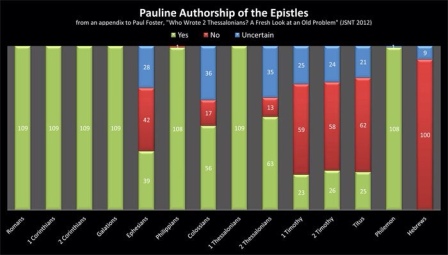
What? You didn't see it? Neither did I.
*Sigh.*
10:52 AM Have you prayed for Iran yet today? A new leader is being sworn in. He claims to be open to the West. The Persians are a proud people with an ancient history. Pray that God will open a door for humble Christians to spread the message there through scandalous acts of love. Perhaps your church would even like to adopt Iran as an object of fervent, continual prayer. More than that, if and when U.S. citizens are granted visas to enter Iran again, will you be willing to go yourself as a tentmaker to share the love of Jesus in a nation where 90 percent of the population is unreached? Can we at least pray about it?
10:40 AM Good morning one and all! Got time for a brief devotional?
Whenever I discuss the Greek word apostolos with my students, I always ask them to translate the word, not just transliterate it as "apostle." Students usually suggest "personal representative," "messenger," or "ambassador." I tell them that my personal favorite is "envoy," and I usually mention the name Terry Waite as an example. If you recall, Waite was the British hostage released in 1991 after five years of solitary confinement in Lebanon. Waite was not held captive simply because he was a British citizen, however. Terry Waite was serving as the Envoy of the Church of England at the time, a high and honorable position. As an apostolos, he represented in his person the power, prestige, and authority of the entire Anglican Church.

But there's another side to this story. In addition to being an envoy, Waite was a remarkable Christian theologian. When asked how he had survived all those years of solitary confinement, he said:
I have been determined in captivity, and still am determined, to convert this experience into something that will be useful and good for other people. I think that's the way to approach suffering. It seems to me that Christianity doesn't in any way lessen suffering. What it does is enable you to take it, to face it, to work through it, and eventually to convert it.
Wow. Christianity doesn't in any way lessen suffering. I wonder how many Christians, besides me, need to learn this lesson? Today Becky has had excruciating pain. Christianity doesn't in any way lessen suffering. Her body is gradually weakening. Christianity doesn't in any way lessen suffering. I want you to pause right now and ask yourself whether your Christianity is anything like Terry Waite's. Fortitude is integral to Christian living. I say this as perhaps the softest man who has ever walked this earth, a pampered American free of poverty and, for the most part, pain. My task is to avoid suffering at all costs. Convert suffering into good? How impossible that sounds! But for the Christian, only scars produce lasting sanctity. I know this intellectually, but I want to run and scream whenever I face problems. Leveraging suffering for good -- this is actually something I know very little of, but I want to learn how to do it.
O Lord, when Satan sticks a knife into my ribs, or even when trivial discomforts distress me, may you, O Lord, use these thorns to drive me to Yourself and to reveal to me Your appallingly beautiful character. Amen.
Saturday, August 3
7:11 PM Mater, anyone?
5:55 PM Here's a question to ponder: If we are all members of the body of Christ, who might the "appendix" be? Answer here.
5:50 PM Folks, today I'm starting a series of updates on the work God is doing in northern India through our good friends Mammen and Alice Joseph. Their son Moncy was a student mine at the seminary. Over a year ago we sent our son Nigusse there to see the work firsthand. As you may know, the Josephs have a Bible school in which many evangelists and church planters are being trained to take the Good News to the unreached people groups in their region, which borders Bangladesh, Nepal, and Sikkim. Some of you have already "adopted" a student and are supporting him for his training. If you're not yet involved but would like to help us train these pioneer missionaries, just send me an email. It's a two-year commitment -- at only $25.00 a month.
The following comes from brother Mammen.
____________________________
Name – Milion Hembrom

People group from – Santhali
Languages known – Santhali, Bengali and Hindi
Milion is from the Bangladesh border of the West Bengal region. He is first from his family and village to accept Christ and to come to the Seminary to study God’s word.
Milion wants to serve God in the border regions of Bangladesh and share the good new to people who have never heard it. He is praying for a change and a great love for Christ in His village.
We request your prayers for Milion.
I am glad to report that Milion has recently been sponsored. Praise the Lord!
4:48 PM Interested in studying the New Testament? Why not consider SEBTS? By the way, Charles Quarles is joining our team this fall. Welcome aboard, Chuck!
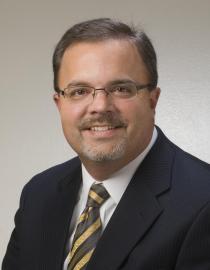
4:32 PM I am (and have always been) a vagabond of sorts. I feel I could live practically anywhere on God's green earth. It doesn't matter whether I'm enjoying the beaches of Hawaii or the museums of Switzerland or the cultural mosaic of Southern California. God has impressed on my heart recently the importance of just being available -- willing to go wherever He leads and do whatever He calls me to do. For now that means living in the South. For over 10 years now we've pushed out roots into Virginia soil. It's a blessing to live in the country, far from the noise of the metropolis. But it's also a responsibility. Becky and I have always felt this way. Rosewood Farm never belonged to us. It belongs to Him. And despite the fact that He doesn't need us, He has made it His work to enter into a relationship with us, to love us and walk with us and even use us to be a blessing to others. I don't think I've heard God speak to me so clearly than when I hear the words of an old hymn:
Give of your best to Master, give Him first place in your heart. Give Him first place in your service, consecrate every part. Give, and to you will be given, God His beloved Son gave. Gratefully seeking to serve Him, give Him the best that you have.
For so many years I gave God the leftovers. Now I want to give of my best to the Master. I say that realizing all over again just how unworthy I am of God's heart. How can I ever make a difference? Lord, let it be through my teaching and writing, through my experiences that rock my confidence to the core, through all of "my" possessions. And through this farm.
That's our heart, friends. Becky and I have tried to use this property, every inch of it, for God's glory ever since He enabled us to purchase it. And so we've prepared a little brochure about Rosewood. It describes the retreat ministry we've had here for many years and that we hope to continue for many more years to come. We'll have it professionally printed and then we'll distribute it far and wide -- to churches and ministries, to Christian organizations local and far away. I love this farm. I love it so much I want others to continue to enjoy its peace, its solitude. There is hope and healing in Christ. No matter how broken you and I are. And if we can help you get reconnected with the Master, we're ready to help.
Thanks, Karen, for doing such a splendid job of designing the brochure on the computer for us. It looks great. And to all my readers: what I need from you is your prayers. Keep praying for Becky and for all those who help me take care of her. They are doing an amazing job. Becky still serves the Lord wholeheartedly. And, whether you realize it or not, you are part of this work through your prayers. And that, folks, deserves an exclamation point!
Blessings,
Dave
P.S. Below is the text for our brochure about the farm. It's still a work in progress but I think it will give you the gist of what we want to say.
_______________________________________
Introducing Bradford Hall and Maple Ridge
Greetings in the name of our wonderful Savior!
Allow us to introduce ourselves. We are Dave and Becky Black. We live on a secluded 123-acre farm in southern Virginia called Rosewood. God has blessed us with two homes that we seek to use for His glory. After all, they belong to Him!
Bradford Hall is our personal residence. We built it to resemble a quaint 1820s farm house. Here we accommodate guests who desire a place of rest and refuge, a place to focus intently upon God, a place of solitude and prayer. Over the years, Bradford Hall has hosted hundreds of people – students, married couples, singles, church leaders, and furloughing missionaries.
In addition to Bradford Hall, which is designed for short-term retreats, we also have Maple Ridge. Originally build in 1810, Maple Ridge has been completely renovated and is equipped with such modern amenities as air conditioning and a complete kitchen. We designed Maple Ridge to accommodate larger families on retreat or families needing temporary housing. They can stay at Maple Ridge from a few days up to 6 months. These families are sometimes in a period of transition or adjustment. We especially want to minister to families who have been wounded in so-called “fulltime Christian ministry.” Maple Ridge is a safe shelter in which to put body and soul back together and to seek guidance from the Lord for the next step.
If you would like to talk to us about staying at either Bradford Hall or Maple Ridge, please free to contact us. In the meantime, our prayer is that the peace of God, which exceeds anything we can understand, will guard your hearts and minds as you live in union with Christ Jesus. May His Spirit serve as a compass for your souls, leading you in the direction God intends for your lives.
In the precious Lamb,
Dave and Becky Black
9:15 AM Did you know that in my book The Jesus Paradigm I devote an entire chapter to the Anabaptists? Here I try to remind my readers that the way forward is backward – back to the sixteenth century, back to the astonishingly deep and balanced view of ecclesiology that Anabaptism represented and back even further to the radicals of the first century, the original generation of Christians that turned the world right side up. I believe that the old values are still worth pursuing. And – thank God! – they have not been completely forgotten.
Read the Anabaptists. Your life might be radically different as the result.

9:02 AM In my book Godworld (about kingdom living) one of the subjects I'm attempting to reexamine are the arguments for pacifism among certain groups of followers of Jesus. One of the best resources I've found is John Yoder's When War Is Unjust: Being Honest in Just-War Thinking, sec. ed. (Maryknoll, NY: Orbis, 1996). In fact, everything Yoder writes is interesting. In his brilliant essay "The Reception of the Just War Tradition by the Magisterial Reformers," History of European Ideas 9 (1988), 20-21, Yoder concludes:
Before the Reformation, the just war tradition was an inchoate body of distinctions and rules of thumb whereby confessors, canon lawyers and moralists hoped to restrain war, once it was clear (since the Constantinian establishment) that they could not forbid it. The intent to restrain evil was sincere. It could issue in penitential disciplines. For the early Martin Luther it could (hypothetically) demand selective conscientious objection.
After the Reformation, the ordinary meaning of the mention of the "just war" in the creeds, to the ordinary Protestant, clerical or lay, was the opposite. War is all right. Those who reject it are condemned by name. The sovereign who sends his subjects to war is prima facie trustworthy as a judge of cause and means. The way is open for citizen-soldiers and for uncritical Protestant patriotism. There should be no surprise that the first strong modern objection to total war in the light of the just war tradition should have come from Roman Catholics.
Sure makes you think! Another fascinating analysis of the ideological forces that underlie the just war tradition in America is Roger G. Betsworth's Social Ethics: An Examination of American Moral Traditions (Louisville: Westminster/ John Knox, 1990), 107-37. Betsworth suggests that the modern imperialist nation-state has little interest in administering the just war tradition justly because it undermines that nation's "right" to include other nations in the overarching "order" of its empire. While I do not necessarily agree with Betsworth's assessment, I believe it merits serious consideration.
Any other works I should look at?
Incidentally, all of you Dietrich Bonhoeffer lovers out there, get this:
The command, "you shall not kill," and the Word "love your enemy," are given to us simply to obey. Every form of war service, unless it be Good Samaritan service, and every preparation for war, is forbidden for the Christian. Faith that sees freedom from the law as a mere arbitrary disposal of the law is only human faith in defiance of God. Simple obedience knows nothing of the fine distinction between good and evil. It lives in the discipleship of Christ and does good work as something self-evident.
Yes, he actually made that statement!
Friday, August 2
6:53 PM Good post here: Depending on Others and Understanding. The money quote:
My point here is that while you are dependent on scholars and other Bible students, there are useful and profitable ways of using their work, while there are also unprofitable ways. It is unprofitable to simply accept the conclusions that someone comes to about scripture, and then say that it must be so because that person is an expert. No matter what the topic, you will likely find an expert who disagrees. That’s why scholars do so much footnoting when they write for one another. Scholars check each other’s work.
6:44 PM And the winners are:
Glenn Kerstetter and Jason Kees
That's right, we have two winners to our translation contest. I couldn't decide whose work was better, so both will receive a copy of The Authorship of Hebrews when it is released.
Look for another contest soon!
5:46 PM Good afternoon, and thanks for blogging in, everyone. Today I picked up Nigusse from the seminary and on the drive home we were listening to one of America's great preachers waxing elephant about the end times from 2 Tim. 3. He read his text from the KJV: "For men shall be lovers of their own selves, covetous, ... incontinent ...."
Incontinent?
Try explaining that word to someone whose first language is not English. "Ever heard of Depends?" I asked Nigusse. Of course, loss of bladder control was probably not what Paul had in mind. But isn't that the meaning that came to your mind first?
That same preacher has all of his messages online for free. Since Becky and I have been going through 1 Corinthians in our daily Bible time, I thought I'd see what he did with the much-maligned noun hyperetai in 1 Cor. 4:1 (traditionally rendered "servants"). Much to my chagrin, he insisted that the term referred to the under rowers of a trireme! Folks, this fallacy was exposed years ago by Don Carson in his book Exegetical Fallacies (pp. 27-28). Not even Bauer lists "under rower" as a gloss for hyperetes. This is lexical pedantry, pure and simple. Think about it. If pastors get this wrong, what hope is there for us lesser mortals?
All this is an excuse for me to commend to you two excellent resources:
1) The first is a pdf. essay called General Linguistics and Some Exegetical Fallacies by Kenneth Cherney.
2) The other is a book I had the honor of co-editing along with Allan Bevere called "In the Original Text It Says." It's by Ben Baxter, an up-and-coming Greek scholar at McMaster Divinity School.

Since all of you are such thoughtful bloggerites, I'm sure you'll want to become conversant with these fallacies that continue to be foisted upon an all-too gullible Christian public.
Don't say I didn't warn you.
Bye for now,
Dave
8:32 AM Are you a cessasionist or a continualist? I want to go on record and affirm that I am a passionate continualist.
-
I believe we ought to continue the pattern of simple, radical, life-style evangelism begun in the book of Acts. After all, it worked for the early church.
-
I believe we ought to continue bearing a humble, faithful, and consistent testimony to Christ, as the early believers did. Let moderns appeal to the sensational and spectacular; even the early church knew of signs and wonders. But the greatest work of the church has not been the spectacular but rather the faithful day-in and day-out living of normal everyday Christians.
-
I believe we ought to continue the pattern of church discipline as practiced by the early church and call out "play Christians" that only go through the motions thinking they are Christians but unaware they are only pretending. When the secular press begins to mock our inflated membership statistics, isn't it time we did something about it?
-
I believe we ought to get out of our cozy churches and put Christ on display in the world's darkness where we are needed. For the early Christians, the field was the world, and the corn of wheat had to die if it was to please God and bear fruit. Why, then, do we sit around debating theological puzzles when we ought to plant our lives in the ugly soil of the world?
-
I believe we ought to continue the emphasis of the New Testament upon every-member ministry, since we are all priests – every one of us – of the Most High God. No church in the New Testament had a single pastor who did all the work. If you have such a leader in your church, fire him – and then hire him back immediately as your CEO, "Chief Equipping Officer" (Eph. 4:12).
-
I believe we ought to continue the early church's rejection of blind patriotism. The only Christian nation the Bible knows is the blood-bought, born-again purchased people of God.
-
I believe we ought to follow the example of the apostle Paul and eschew the excellence of human oratory and any appeal to human wisdom. Nothing about the Gospel pleases this world – nothing! – and we are never so foolish as when we try to dress it up in the garish garments of this age.
-
I believe we ought to continue the example of the early church and reject position and power as the measuring sticks of success. Why should we seek prominent seats in the kingdom when our Lord promised us not seats but suffering? Obedience cost John the Baptist his head and Jonathan Edwards his pulpit. What has it cost us?
So ... are you a cessasionist or a continualist?
8:08 AM Had a conversation recently with someone about the importance of Greek. Why do I love teaching this language so much? Because it empowers students. Because it helps them to think for themselves. Because it gives them a tool for critiquing and decision-making. People need to learn how to evaluate the experts so that they be can criticized, corrected, or even rejected as experts. If our desire is to truly foster obedient followers of King Jesus, we must look to the Word of God to guide us.
Here's just one example where Greek can give us a clearer picture of what the text is saying: Hebrews 1:1-4: A Study in Discourse Analysis.
7:58 AM Saying "I was wrong" is more powerful than saying "I am sorry." To acknowledge that you are wrong is to take responsibility for your actions.
7:44 AM Writing is an act of worship. While sitting at our computers we fall on our faces at the cross and express our gratitude for the unfathomable grace of God.
Thursday, August 1
8:22 PM So grateful for this sound advice from SEBTS grad Matt Emerson:
Busy-ness kills continued language proficiency. I’m working on building mine back up, and at times it’s easier than at others. But if I had listened to Dr. Black, if I had kept my membership in the 5 minute Greek club, it wouldn’t be an issue at all.
So my advice is simple – don’t let the languages go. They are vital to understanding God’s Word to us, and that means that pastors and professors alike ought to know them and know them well. It’s better to keep on knowing them than to have known them once and left them.
Amen and amen.
7:22 PM Becky writes:
PRAISE GOD FROM WHOM ALL BLESSINGS FLOW!! Just a few short weeks ago we presented a matching challenge for the funds needed to build a private school in Northeast India. There are many good reasons for this school. The school will be reaching 2,500 students, allowing daily interaction with the Gospel for these students. The income generated by tuition will help the ministry of Peniel Gospel Team to be largely self-supported. Having a private school will facilitate good relations with the community and the Indian government.
The building is well underway. Eventually it will be 4 stories high. We’re asking the Lord to send $50,000 through us this year towards the cost of this building. Praise God, over half of this has already been sent! Currently, a challenge is being given….50% match for the first $10,000 given, then 100% match for the next $10,000 given, and then 150% match for the funds given over $20,000. This challenge will run until Dec 31, 2013.

Praise God, already $11,500 has been given as part of this matching program! That means $18,000 is headed to the school from this challenge. We’re now in the 100% matching bracket. It is my prayer that as you head to the beach or the mountains or the amusement park for your summer vacation, you will not forget the value of investing in the kingdom. Please write us if you have any questions about this matching program.
Allow me to add a brief word to Becky's exciting report. Folks, our business as Christians is to make disciples of all nations. That's what we're here for. By life or by death, by what we do and do not do, in body and in spirit, our business is to work for the expansion of God's kingdom on earth. It is easily possible for us to so focus on our own little communities of faith that we come dangerously close to making a mockery of the Great Commission. Such an attitude is a serious symptom. It reveals a growing disease of the spirit that could become an incurable malignancy. Churches that are in this in-grown state are not concerned about it. Theoretically and theologically we may believe in the Great Commission, but our belief does not motivate much activity. The situation around the world is desperate, but we are not. We drug and dope our consciences and allow things to go on as things have always gone. A sense of urgency for world evangelization is fast disappearing from us.
I encourage all of us to go "all out" for Jesus. He deserves it. Let the dead bury the dead. It's time to plow a straight furrow looking straight ahead.
6:38 PM Good evening, folks! These are very exciting times in which to be involved in New Testament scholarship, when God is doing a fresh work calling Christians to think critically about questions that matter. Imagine a church filled with people who are intellectually engaged with their faith! Christians cannot afford to be indifferent to truth. Integrating faith and truth is difficult, but the rewards are great. That's one reason why I'm totally committed to doing scholarship for the church. I also believe in working with publishers who share my belief in the immense practicality and even indispensability of biblical studies for the Christian life. Henry Neufeld, in his latest blog post, writes:
I’m pleased to announce that Energion Publications will be offering a new series of books called Topical Line Drives. This is a branch of our existing Participatory Study Series, and will continue the mission of inviting all church members to participate in the story of God’s action in the world by becoming better informed and putting their knowledge into action.
I agree totally! To be engaged in the task of biblical interpretation is a journey that is both exciting and demanding. I'm hopeful that Henry's new series -- Topical Line Drives -- will help Christians of all stripes think hard about the issues of our day in light of the need for developing a Christian worldview. I find it interesting what Henry says about submissions that deal with controversial subjects:
This is not the place to propose new scholarly ideas. Publish in the peer-reviewed literature first. Adaptations of scholarly articles are good, provided they reach our audience, but for anything outside the mainstream we will be looking for prior scholarly publication. This is not to prevent new ideas from getting a hearing. Rather, it is to make sure that we are demonstrating good scholarship for series readers.
In this I think he's right. Harry Sturz, whom I mentioned earlier today, proposed a radical view of textual criticism, but he earned the right to do so by having engaged in text-critical research at the highest levels (under the famed textual critic E. C. Colwell at Claremont Graduate School). Remember, it is one thing to argue a point of view that is unpopular. It is another thing altogether to claim that you have the right to be heard. Henry's post is rather brief but his point is clear: upset the apple cart if you like, but you had better been driving it for a while. In my inaugural volume, The Authorship of Hebrews, I have attempted to write a readable book that provides a useful discussion of basic arguments for defending the Pauline authorship of this letter. I wrote it realizing full well that we live in what some are calling the most anti-intellectual period in Western history. My response is that of John Wesley:
Ought not a minister to have, first, a good understanding, a clear apprehension, a sound judgment, and a capacity of reasoning with some closeness?
I believe I am a better Christian because of my theological studies, and I believe equally that my theological studies have been sharpened by my daily walk with Jesus. My goal, my hope, my prayer is that this book will help you as well.
Well, enough. Let me close by announcing a new contest for my readers. I'd like for you to have a free copy of The Authorship of Hebrews when it is released shortly, and to do so all you have to do is translate the following simple prose from Greek into English. The passage is based loosely on Paul's letter to the Galatians. I'll receive your translations any time before 6:00 pm tomorrow night, at which time I will announce the winner.
3 ἐγὼ πέμπω εἰρήνην ὑμῖν ἀπὸ θεοῦ καὶ ἡμῶν κυρίου Ἰησοῦ Χριστοῦ.4 ὁ γὰρ θάνατος τοῦ Ἰησοῦ λύει τὴν ἁμαρτίαν καὶ τὸν θάνατον. ὁ δὲ θάνατος τοῦ Ἰησοῦ λύει τὸν Σατανᾶν. Θεὸς γὰρ θέλει ἡμᾶς ἔχειν ζωήν. 5 Θεὸς οὖν ἔχει τὴν δόξαν. ἀμήν.
6 ἐγὼ θαυμάζω ὅτι ὑμεῖς οὐ πιστεύετε εὶς τὸν λόγον τοῦ Χριστοῦ. ἀλλὰ ὑμεῖς πιστεύετε εἰς ἄλλον λόγον.7 ἀλλὰ οὐκ ἔστιν ἄλλος λόγος. ἀλλὰ πονηροὶ ἄνθρωποι θέλουσιν ὑμᾶς πιστεύειν εἰς τὸν λόγον τοῦ Σατανᾶς. 8 ἀλλὰ καὶ εἰ ἄγγελος ἐξ οὐρανοῦ κηρύσσει ὑμῖν ἄλλον λόγον, οὗτος ὁ ἄγγελος οὐ λέγει τὴν ἀλήθειαν.9 πάλιν λέγω ὑμῖν, εἰ ἄνθρωπος κηρύσσει ὑμῖν ἄλλον λόγον, οὗτος ἀνθρωπος ἔχει θάνατον. 10 θέλω γὰρ πείθειν τὸν θεὸν καὶ οὐκ ἀνθρώπους. εἰ ἔτι θέλω πείθειν ἀνθρώπους, οὐκ εἰμι δοῦλος Χριστοῦ.
Until then, keep reading, thinking, and serving.
Dave
10:25 AM Announcing The Authorship of Hebrews.

Here's the back story. It all started in college with one of my professors. Harry Sturz was my Greek teacher and then my colleague in the Greek Department at Biola for many years. Sturz had the temerity to challenge some long-held assumptions about the Byzantine text type. His dissertation The Byzantine Text Type and New Testament Textual Criticism was a black eye against a static status quo. His attitude, for better or for worse, rubbed off on me. "Playing it safe" may mean you've considered the options and believe that the status quo is correct. Or it may simply mean you've never weighed heavily the evidence for yourself. There is a glaring need today for Christians who critically assess the evidence in a wide range of subjects.
That's why I'm glad that Energion has started its new series called "Topical Line Drives." It's a sort of revolution, a rebellion against people whose minds are closed to anti-status-quo thinking. I'm honored and humbled to tell you that Henry Neufeld, publisher of Energion, chose my little book as the inaugural volume in this series. I want to invite you to consider offering Henry that risk-taking book you're been working on. You say, Nobody will listen to me. They'll think I'm crazy! To you I say, with Apple Inc.:
Here's to the crazy ones. The misfits. The rebels. The troublemakers. The round pegs in the square holes. The ones who see things differently.... You can quote them, disagree with them, glorify or vilify them. About the one thing you can't do is ignore them. Because they change things. They push the human race forward.
Long live the revolution!


